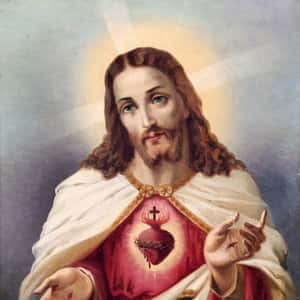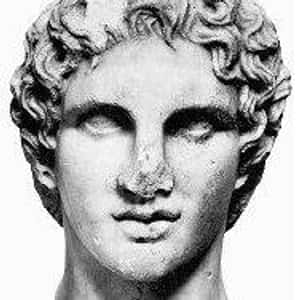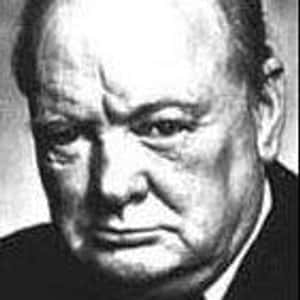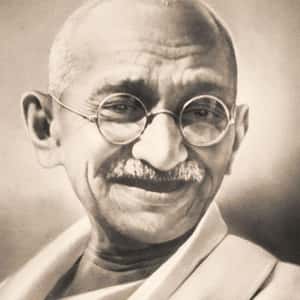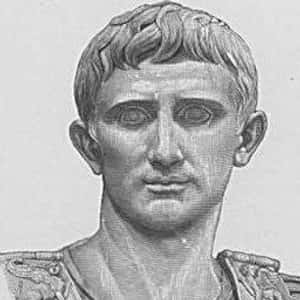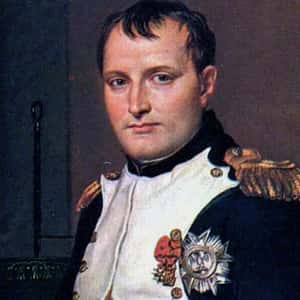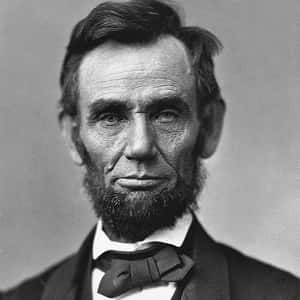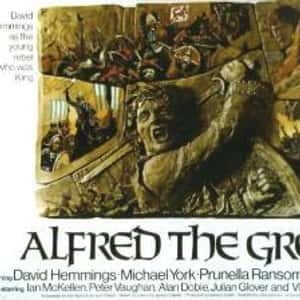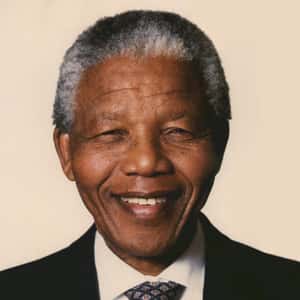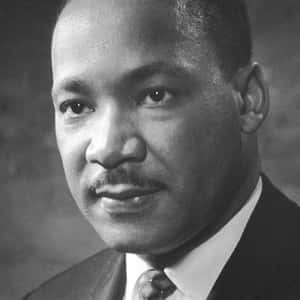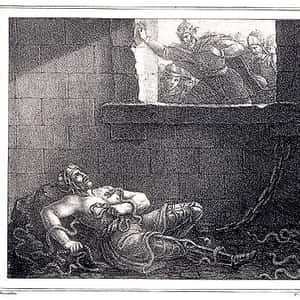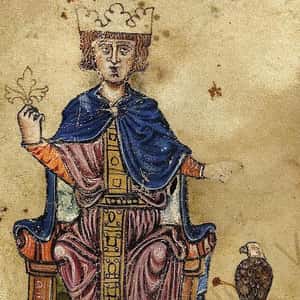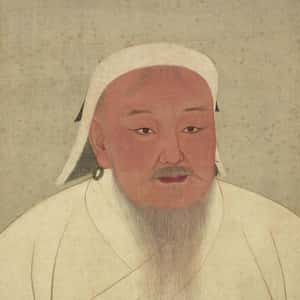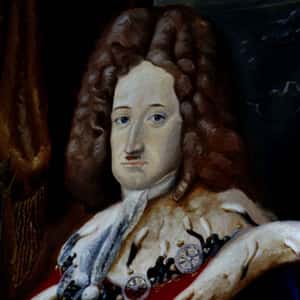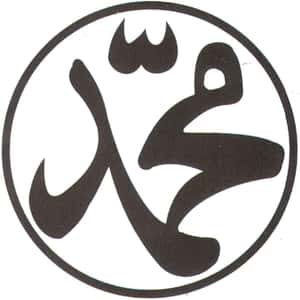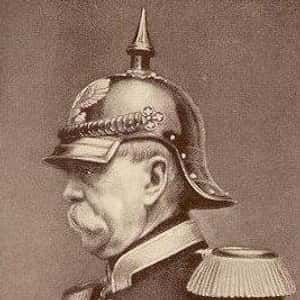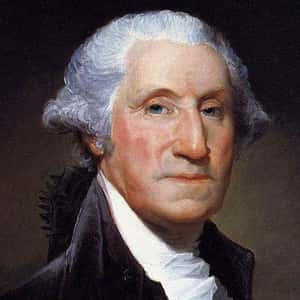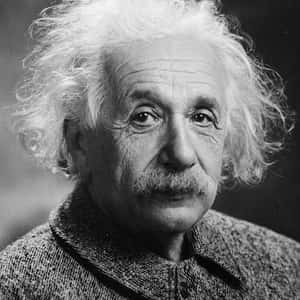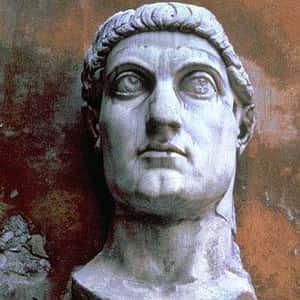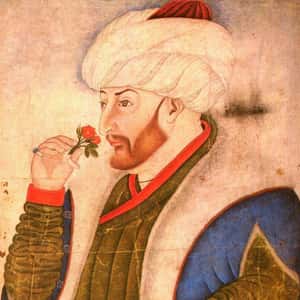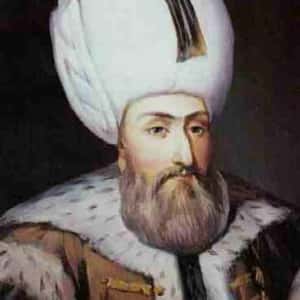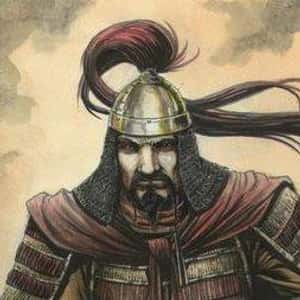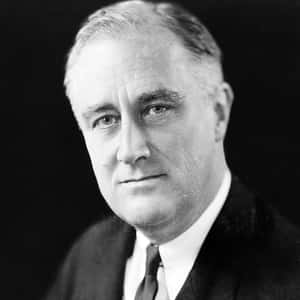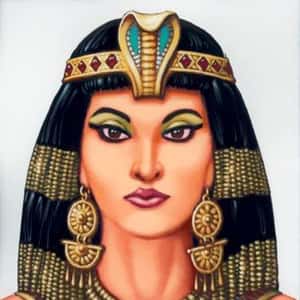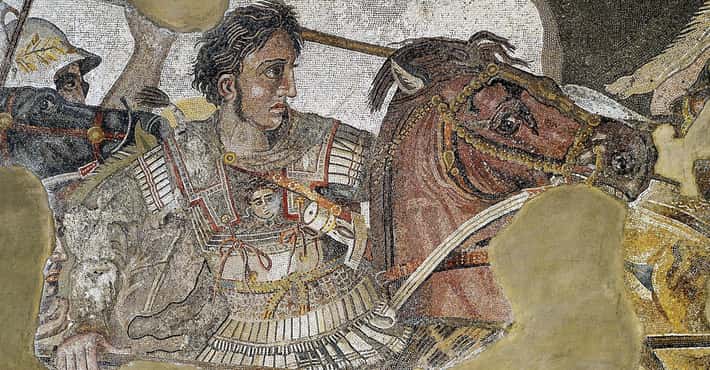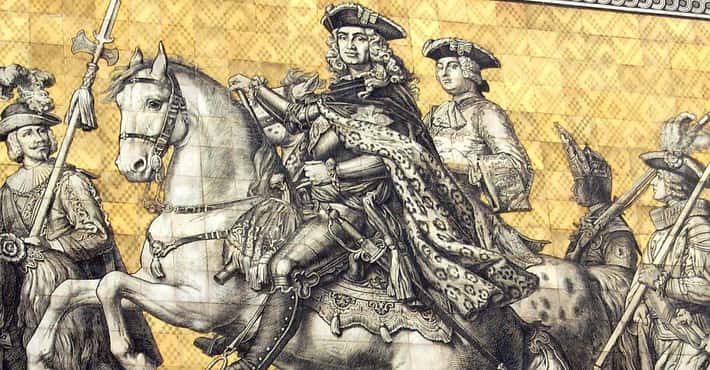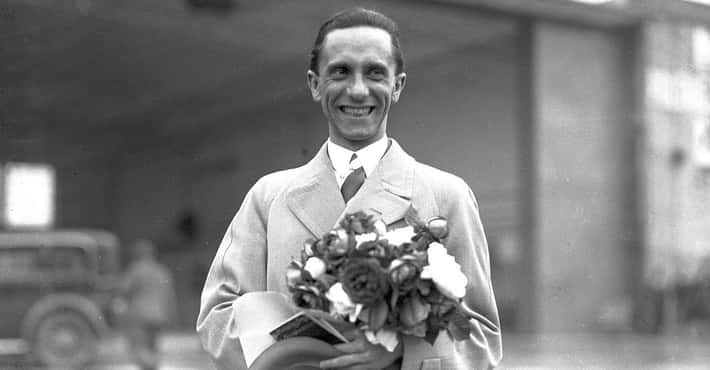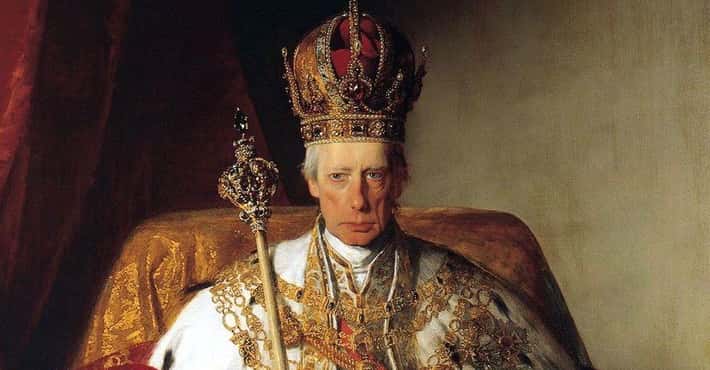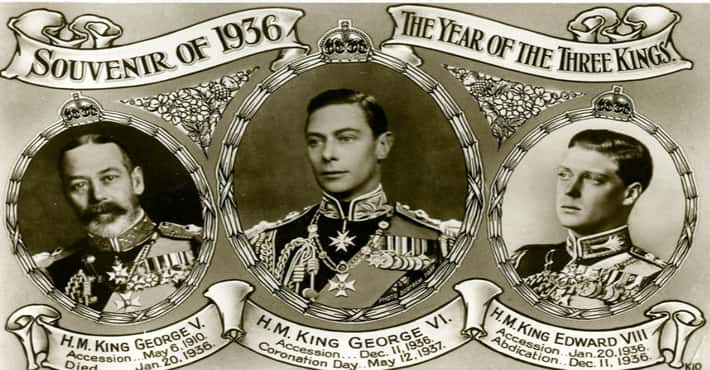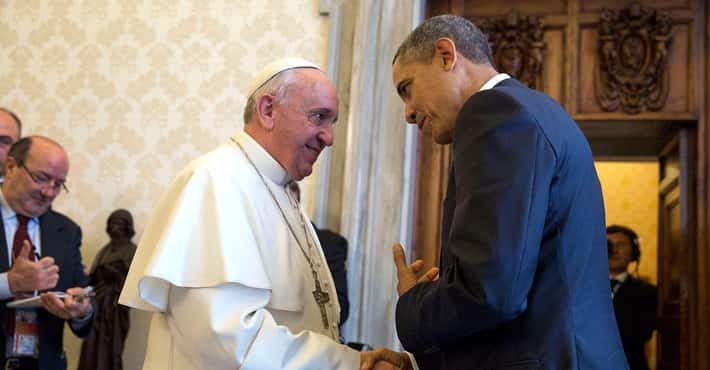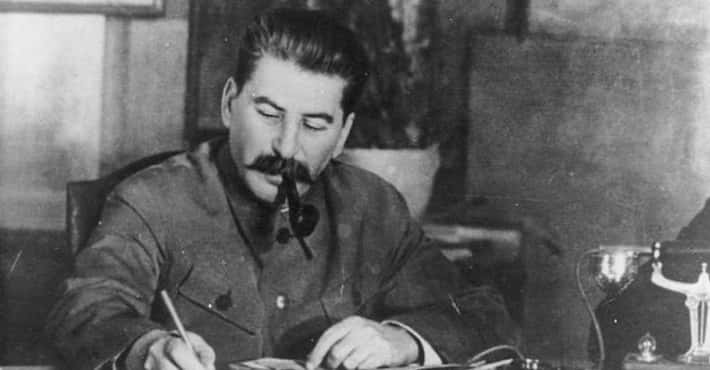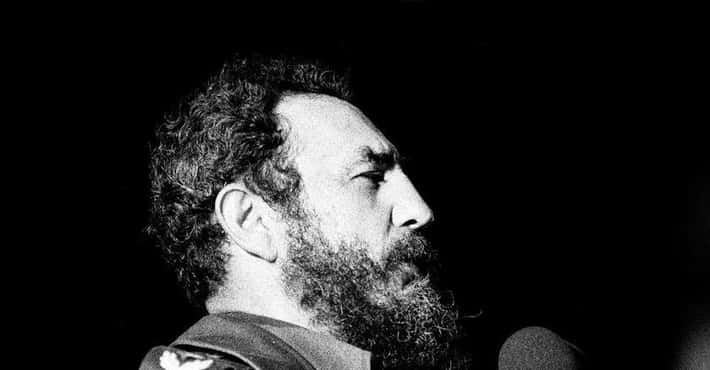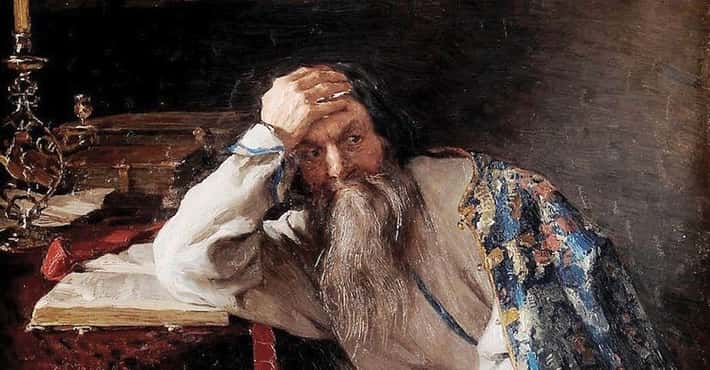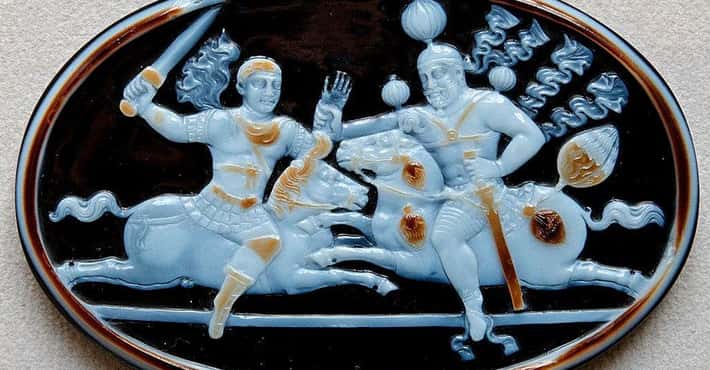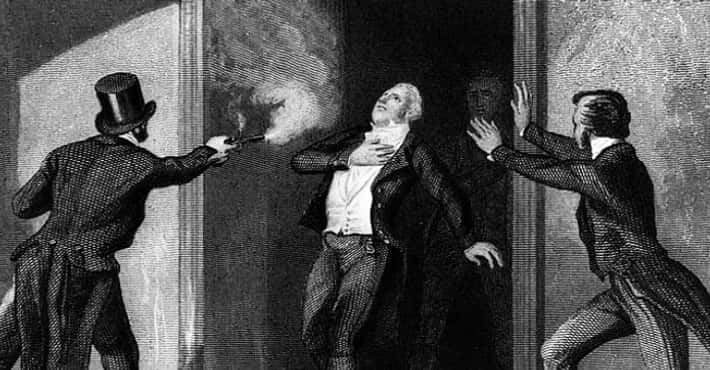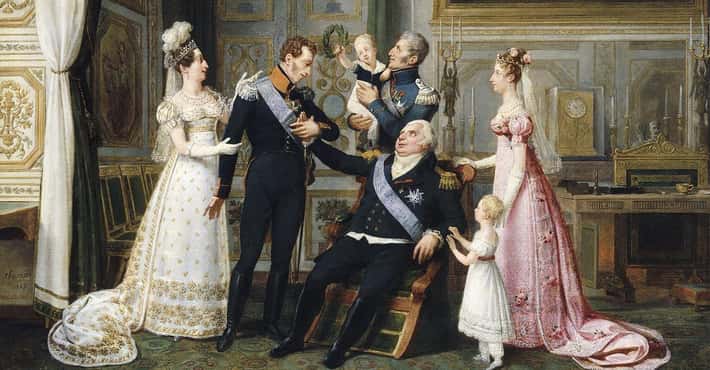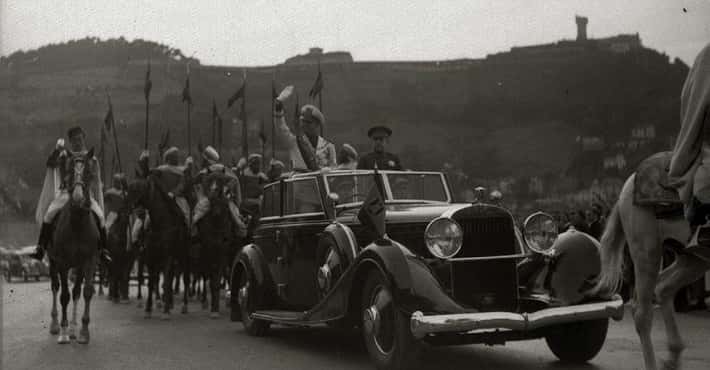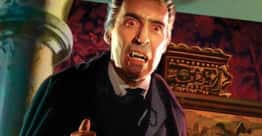The Most Important Leaders In World History
Jesus Christ stands as one of the most influential leaders in history, whose teachings of love, compassion, and forgiveness have shaped the moral and spiritual outlook of millions. His life and message inspired the founding of Christianity, one of the world's largest religions. Beyond religious impact, Jesus' emphasis on social justice and human dignity continues to resonate, influencing countless humanitarian efforts and philosophies centered around kindness and altruism.
Alexander the Great, renowned for his unparalleled military genius, forged one of the largest empires in ancient history by the age of 30. His conquests stretched from Greece to Egypt and deep into Asia, spreading Hellenistic culture and fostering cultural exchange. Alexander's strategies and leadership skills remain studied in military academies today. His ambition and vision not only reshaped the political landscape of his time but also laid the groundwork for future civilizations.
Julius Caesar, a pivotal figure in Roman history, significantly transformed the Roman Republic into the Roman Empire. Renowned for his military conquests, including the notable Gallic Wars, Caesar expanded Rome's territories immensely. Politically astute, he enacted critical reforms that centralized power and improved governance. Despite his assassination in 44 BC, his influence endured, leading to the rise of the Roman Empire under Augustus. Caesar's legacy continues to shape political and military strategies to this day.
Winston Churchill, the British Prime Minister during World War II, is celebrated for his steadfast leadership and stirring oratory that galvanized the nation. His resolve and strategic acumen were pivotal in resisting Nazi aggression and ultimately achieving victory. Beyond the war, Churchill's influence extended to shaping post-war Europe and advocating for democracy. His speeches, marked by their eloquence and determination, have left an enduring legacy, defining him as one of the 20th century's most iconic leaders.
Mahatma Gandhi, a leader of the Indian independence movement, is celebrated for his philosophy of nonviolent resistance, or Satyagraha. Through peaceful protests and civil disobedience, Gandhi inspired millions and played a crucial role in India gaining independence from British rule in 1947. His principles of nonviolence, truth, and social justice have left a lasting impact, influencing civil rights movements worldwide. Gandhi's legacy endures as a symbol of peace and moral integrity.
Augustus Caesar, the first Roman Emperor, transformed Rome from a republic to a powerful empire after fractious years of civil war. Ruling from 27 BC to AD 14, he initiated the Pax Romana, a period of unprecedented peace and prosperity. Augustus' strategic governance, administrative innovations, and public works effectively consolidated his power. His leadership stabilized the empire, facilitated economic development, and left a lasting legacy that shaped the future of Western civilization.
Napoleon Bonaparte, a military and political genius, dramatically altered the course of European history. Rising to prominence during the French Revolution, he established himself as Emperor of the French in 1804. Napoleon's reforms, including the Napoleonic Code, modernized legal systems and inspired nations worldwide. His expansive military campaigns reshaped Europe, although they ultimately led to his downfall at Waterloo in 1815. Napoleon's legacy endures in his contributions to statecraft, military strategy, and civil governance.
Aristotle, an ancient Greek philosopher, profoundly influenced Western thought through his extensive works on science, logic, ethics, politics, and metaphysics. A student of Plato and tutor to Alexander the Great, Aristotle's empirical approach and emphasis on observation laid the groundwork for the scientific method. His writings, especially "Nicomachean Ethics" and "Politics," continue to be foundational texts in philosophy. Aristotle's systematic exploration of knowledge and reality has left an enduring legacy that still resonates in contemporary scholarship.
Abraham Lincoln, the 16th President of the United States, is revered for his leadership during the Civil War and his efforts to abolish slavery. His issuance of the Emancipation Proclamation in 1863 and the passage of the 13th Amendment marked pivotal moments in American history. Lincoln's eloquence, exemplified in the Gettysburg Address, and his commitment to preserving the Union have solidified his legacy as a champion of equality and one of America's greatest presidents.
Socrates, the classical Greek philosopher, is considered one of the most important figures in Western philosophy. Renowned for his Socratic method—a form of cooperative argumentative dialogue—he encouraged critical thinking and self-examination. His teachings laid the groundwork for ethics and epistemology, influencing future philosophers like Plato and Aristotle. Though he left no written works, Socrates' ideas on virtue, wisdom, and the examined life profoundly shaped intellectual discourse and continue to impact modern thought and education.
Galileo Galilei, often called the "father of modern science," revolutionized our understanding of astronomy and physics. His use of the telescope led to groundbreaking discoveries like the moons of Jupiter and the phases of Venus, challenging geocentric views. Galileo's advocacy for the scientific method and empirical evidence laid the foundation for modern scientific inquiry. Despite facing opposition from the Church, his contributions fundamentally transformed our perception of the universe and spurred the Scientific Revolution.
Alfred the Great, King of Wessex, is celebrated for his defense against Viking invasions and his efforts to unify England. Reigning from 871 to 899 AD, he successfully repelled Danish forces and established a strong, resilient kingdom. Beyond his military prowess, Alfred championed education and legal reform, translating important texts into English and creating a legal code. His visionary leadership and cultural advancements earned him enduring respect as one of England's greatest monarchs.
Plato, a towering figure in ancient Greek philosophy, founded the Academy in Athens and profoundly influenced Western thought. A student of Socrates and teacher to Aristotle, Plato's writings, including "The Republic," explored justice, ethics, politics, and metaphysics. His theory of ideal Forms and the allegory of the cave remain foundational concepts in philosophy. Plato's dialogues not only documented Socratic teachings but also laid the groundwork for Western philosophical and educational traditions, shaping intellectual discourse through the ages.
Nelson Mandela, a towering figure in the fight against apartheid, became South Africa's first black president in 1994. Imprisoned for 27 years, Mandela's unwavering commitment to justice and equality transformed him into a global symbol of resistance and reconciliation. His leadership in transitioning South Africa to a multiracial democracy earned him worldwide respect and the Nobel Peace Prize in 1993. Mandela’s legacy endures as a testament to the power of forgiveness, resilience, and the pursuit of human dignity.
Martin Luther King Jr., a pivotal leader in the American civil rights movement, championed equality through nonviolent protest. His advocacy for racial justice, exemplified by his "I Have a Dream" speech, inspired a nation and led to the dismantling of segregation laws. King's efforts were instrumental in passing landmark legislation like the Civil Rights Act of 1964. Despite his assassination in 1968, his legacy endures as a symbol of hope, courage, and the ongoing fight for human rights.
Greatest Viking of them all. Ragnar Lodbrok, a legendary Viking chieftain, is renowned for his exploits and conquests during the Viking Age. Celebrated in Norse sagas and medieval poetry, Ragnar is said to have led daring raids across Europe, including the sacking of Paris and the invasion of England. His legendary status is bolstered by his supposed lineage, including sons like Bjorn Ironside. Though his historical existence is debated, Ragnar's mythic legacy continues to captivate the imagination and culture of the Viking era.
Marcus Aurelius, a Roman Emperor from 161 to 180 AD, is celebrated not only for his leadership but also for his contributions to philosophy. As a Stoic philosopher, his writings, compiled in Meditations, offer timeless insights on duty, resilience, and the nature of human existence. His reign, marked by military challenges and internal stability, showcased his commitment to justice and wisdom. Marcus Aurelius' legacy endures as a philosopher-king whose thoughts continue to inspire and guide.
Frederick II, Holy Roman Emperor from 1220 to 1250, was a remarkable ruler known for his intellectual curiosity and cultural contributions. Often called "Stupor Mundi" or "Wonder of the World," he was a patron of arts and sciences, founding the University of Naples. Politically, Frederick skillfully balanced power between the papacy and the empire while promoting legal reforms. His reign was marked by efforts to consolidate imperial authority and foster a renaissance in learning and culture.
- Frederick II (German: Friedrich II.; 24 January 1712 – 17 August 1786) ruled the Kingdom of Prussia from 1740 until 1786, the longest reign of any Hohenzollern king, at 46 years. His most significant accomplishments during his reign included his military victories, his reorganization of Prussian armies, his patronage of the arts and the Enlightenment and his final success against great odds in the Seven Years' War. Frederick was the last Hohenzollern monarch titled King in Prussia and declared himself King of Prussia after achieving sovereignty over most historically Prussian lands in 1772. Prussia had greatly increased its territories and became a leading military power in Europe under his rule. He became known as Frederick the Great (Friedrich der Große) and was nicknamed Der Alte Fritz ("The Old Fritz") by the Prussian people and eventually the rest of Germany.In his youth, Frederick was more interested in music and philosophy than the art of war. Nonetheless, upon ascending to the Prussian throne he attacked Austria and claimed Silesia during the Silesian Wars, winning military acclaim for himself and Prussia. Toward the end of his reign, Frederick physically connected most of his realm by acquiring Polish territories in the First Partition of Poland. He was an influential military theorist whose analysis emerged from his extensive personal battlefield experience and covered issues of strategy, tactics, mobility and logistics. Considering himself "the first servant of the state", Frederick was a proponent of enlightened absolutism. He modernized the Prussian bureaucracy and civil service and pursued religious policies throughout his realm that ranged from tolerance to segregation. He reformed the judicial system and made it possible for men not of noble status to become judges and senior bureaucrats. Frederick also encouraged immigrants of various nationalities and faiths to come to Prussia, although he enacted oppressive measures against Polish Catholic subjects in West Prussia. Frederick supported arts and philosophers he favored as well as allowing complete freedom of the press and literature. Most modern biographers agree that Frederick was primarily homosexual, and that his sexual orientation was central to his life and character. Frederick is buried at his favorite residence, Sanssouci in Potsdam. Because he died childless, Frederick was succeeded by his nephew, Frederick William II, son of his brother, Augustus William. Nearly all 19th-century German historians made Frederick into a romantic model of a glorified warrior, praising his leadership, administrative efficiency, devotion to duty and success in building up Prussia to a great power in Europe. Historian Leopold von Ranke was unstinting in his praise of Frederick's "heroic life, inspired by great ideas, filled with feats of arms ... immortalized by the raising of the Prussian state to the rank of a power". Johann Gustav Droysen was even more extolling. Frederick remained an admired historical figure through Germany's defeat in World War I. The Nazis glorified him as a great German leader pre-figuring Adolf Hitler, who personally idolized him. Associations with him became far less favorable after the fall of the Nazis, largely due to his status as one of their symbols. However, by the 21st century a re-evaluation of his legacy as a great general and enlightened monarch returned opinion of him to favour.
Genghis Khan, born Temujin, founded the Mongol Empire and became one of history’s most formidable conquerors. Uniting the Mongol tribes, he expanded his empire across Asia and Europe through strategic prowess and ruthless efficiency. Genghis Khan's legacy includes not only vast territorial conquests but also innovations in governance, trade, and legal systems. His influence reshaped cultures and economies, laying the groundwork for the interconnected Silk Road. Genghis Khan's impact continues to resonate through history.
- 21
Frederick I. of Prussia
Founded the Kingdom of Prussia in 1701.Frederick I (German: Friedrich I.; 11 July 1657 – 25 February 1713), of the Hohenzollern dynasty, was (as Frederick III) Elector of Brandenburg (1688–1713) and Duke of Prussia in personal union (Brandenburg-Prussia). The latter function he upgraded to royalty, becoming the first King in Prussia (1701–1713). From 1707 he was in personal union the sovereign prince of the Principality of Neuchâtel (German: Fürstentum Neuenburg). He was also the paternal grandfather of Frederick the Great. - Martin Luther, , (; German: [ˈmaɐ̯tiːn ˈlʊtɐ]; 10 November 1483 – 18 February 1546) was a German professor of theology, composer, priest, monk, and a seminal figure in the Protestant Reformation. Luther was ordained to the priesthood in 1507. He came to reject several teachings and practices of the Roman Catholic Church; in particular, he disputed the view on indulgences. Luther proposed an academic discussion of the practice and efficacy of indulgences in his Ninety-five Theses of 1517. His refusal to renounce all of his writings at the demand of Pope Leo X in 1520 and the Holy Roman Emperor Charles V at the Diet of Worms in 1521 resulted in his excommunication by the pope and condemnation as an outlaw by the Holy Roman Emperor. Luther taught that salvation and, consequently, eternal life are not earned by good deeds but are received only as the free gift of God's grace through the believer's faith in Jesus Christ as redeemer from sin. His theology challenged the authority and office of the Pope by teaching that the Bible is the only source of divinely revealed knowledge, and opposed sacerdotalism by considering all baptized Christians to be a holy priesthood. Those who identify with these, and all of Luther's wider teachings, are called Lutherans, though Luther insisted on Christian or Evangelical (German: evangelisch) as the only acceptable names for individuals who professed Christ. His translation of the Bible into the German vernacular (instead of Latin) made it more accessible to the laity, an event that had a tremendous impact on both the church and German culture. It fostered the development of a standard version of the German language, added several principles to the art of translation, and influenced the writing of an English translation, the Tyndale Bible. His hymns influenced the development of singing in Protestant churches. His marriage to Katharina von Bora, a former nun, set a model for the practice of clerical marriage, allowing Protestant clergy to marry.In two of his later works, Luther expressed antagonistic views towards Jews. His rhetoric was not directed at Jews alone, but also towards Roman Catholics, Anabaptists, and nontrinitarian Christians. Luther died in 1546 with Pope Leo X's excommunication still effective.
Hazrat Muhammad, the Prophet of Islam, is revered as the final messenger of God in Islamic tradition. Born in Mecca in 570 AD, his revelations from Allah, compiled in the Quran, form the foundation of Islamic faith and practice. Muhammad's teachings emphasized monotheism, compassion, and social justice, profoundly transforming the Arabian Peninsula and beyond. His leadership in establishing the first Muslim community and his moral example continue to guide and inspire over a billion Muslims worldwide.
- Lead to the unification of Germany in 1871, and first chancellor of the German Empire.Otto Eduard Leopold, Prince of Bismarck, Duke of Lauenburg (Born von Bismarck-Schönhausen; German: Otto Eduard Leopold Fürst von Bismarck, Herzog zu Lauenburg; 1 April 1815 – 30 July 1898), known as Otto von Bismarck (German: [ˈʔɔto fɔn ˈbɪsmaɐ̯k] (listen)), was a conservative Prussian statesman who dominated German and European affairs from the 1860s until 1890 and was the first Chancellor of the German Empire between 1871 and 1890. In 1862, King Wilhelm I appointed him as Minister President of Prussia, a position he would hold until 1890, with the exception of a short break in 1873. He provoked three short, decisive wars against Denmark, Austria, and France. Following the victory against Austria, he abolished the supranational German Confederation and instead formed the North German Confederation as the first German national state in 1867, leading it as Federal Chancellor. This aligned the smaller North German states behind Prussia. Later receiving the support of the independent South German states in the Confederation's defeat of France, he formed the German Empire in 1871, unifying Germany with himself as Imperial Chancellor, while retaining control of Prussia at the same time. The new German nation excluded Austria, which had been Prussia's main opponent for predominance among the German states. With Prussian dominance accomplished by 1871, Bismarck skillfully used balance of power diplomacy to maintain Germany's position in a Europe which, despite many disputes and war scares, remained at peace. For historian Eric Hobsbawm, it was Bismarck who "remained undisputed world champion at the game of multilateral diplomatic chess for almost twenty years after 1871, [and] devoted himself exclusively, and successfully, to maintaining peace between the powers". However, his annexation of Alsace-Lorraine gave new fuel to French nationalism and promoted Germanophobia in France. This helped set the stage for the First World War. Bismarck's diplomacy of realpolitik and powerful rule at home gained him the nickname the "Iron Chancellor". German unification and its rapid economic growth was the foundation to his foreign policy. He disliked colonialism but reluctantly built an overseas empire when it was demanded by both elite and mass opinion. Juggling a very complex interlocking series of conferences, negotiations and alliances, he used his diplomatic skills to maintain Germany's position and used the balance of power to keep Europe at peace in the 1870s and 1880s. A master of complex politics at home, Bismarck created the first welfare state in the modern world, with the goal of gaining working class support that might otherwise go to his Socialist enemies. In the 1870s, he allied himself with the Liberals (who were low-tariff and anti-Catholic) and fought the Catholic Church in what was called the Kulturkampf ("culture struggle"). He lost that battle as the Catholics responded by forming a powerful Centre party and using universal male suffrage to gain a bloc of seats. Bismarck then reversed himself, ended the Kulturkampf, broke with the Liberals, imposed protective tariffs, and formed a political alliance with the Centre Party to fight the Socialists. A devout Lutheran, he was loyal to his king, who argued with Bismarck but in the end supported him against the advice of his wife and his heir. While the Reichstag, Germany's parliament, was elected by universal male suffrage, it did not have much control of government policy. Bismarck distrusted democracy and ruled through a strong, well-trained bureaucracy with power in the hands of a traditional Junker elite that consisted of the landed nobility in eastern Prussia. Under Wilhelm I, Bismarck largely controlled domestic and foreign affairs, until he was removed by the young Kaiser Wilhelm II in 1890, at the age of seventy-five. Bismarck – a Junker himself – was strong-willed, outspoken and overbearing, but he could also be polite, charming and witty. Occasionally he displayed a violent temper, and he kept his power by melodramatically threatening resignation time and again, which cowed Wilhelm I. He possessed not only a long-term national and international vision but also the short-term ability to juggle complex developments. As the leader of what historians call "revolutionary conservatism", Bismarck became a hero to German nationalists; they built many monuments honoring the founder of the new Reich. Many historians praise him as a visionary who was instrumental in uniting Germany and, once that had been accomplished, kept the peace in Europe through adroit diplomacy.
- George Washington was the first President of the United States, the Commander-in-Chief of the Continental Army, and one of the Founding Fathers of the United States. He presided over the convention that drafted the United States Constitution, which replaced the Articles of Confederation and remains the supreme law of the land. Washington was unanimously elected President by the electors in both the 17881789 and 1792 elections.
- Albert Einstein ( EYEN-styne; German: [ˈalbɛɐ̯t ˈʔaɪnʃtaɪn] (listen); 14 March 1879 – 18 April 1955) was a German-born theoretical physicist who developed the theory of relativity, one of the two pillars of modern physics (alongside quantum mechanics). His work is also known for its influence on the philosophy of science. He is best known to the general public for his mass–energy equivalence formula E = m c 2 {\displaystyle E=mc^{2}} , which has been dubbed "the world's most famous equation". He received the 1921 Nobel Prize in Physics "for his services to theoretical physics, and especially for his discovery of the law of the photoelectric effect", a pivotal step in the development of quantum theory. Near the beginning of his career, Einstein thought that Newtonian mechanics was no longer enough to reconcile the laws of classical mechanics with the laws of the electromagnetic field. This led him to develop his special theory of relativity during his time at the Swiss Patent Office in Bern (1902–1909). However, he realized that the principle of relativity could also be extended to gravitational fields, and he published a paper on general relativity in 1916 with his theory of gravitation. He continued to deal with problems of statistical mechanics and quantum theory, which led to his explanations of particle theory and the motion of molecules. He also investigated the thermal properties of light which laid the foundation of the photon theory of light. In 1917, he applied the general theory of relativity to model the structure of the universe.Except for one year in Prague, Einstein lived in Switzerland between 1895 and 1914, during which time he renounced his German citizenship in 1896, then received his academic diploma from the Swiss federal polytechnic school (later the Eidgenössische Technische Hochschule, ETH) in Zürich in 1900. After being stateless for more than five years, he acquired Swiss citizenship in 1901, which he kept for the rest of his life. In 1905, he was awarded a PhD by the University of Zurich. The same year, he published four groundbreaking papers during his renowned annus mirabilis (miracle year) which brought him to the notice of the academic world at the age of 26. Einstein taught theoretical physics at Zurich between 1912 and 1914, before he left for Berlin, where he was elected to the Prussian Academy of Sciences. In 1933, while Einstein was visiting the United States, Adolf Hitler came to power. Because of his Jewish background, Einstein did not return to Germany. He settled in the United States and became an American citizen in 1940. On the eve of World War II, he endorsed a letter to President Franklin D. Roosevelt alerting him to the potential development of "extremely powerful bombs of a new type" and recommending that the US begin similar research. This eventually led to the Manhattan Project. Einstein supported the Allies, but he generally denounced the idea of using nuclear fission as a weapon. He signed the Russell–Einstein Manifesto with British philosopher Bertrand Russell, which highlighted the danger of nuclear weapons. He was affiliated with the Institute for Advanced Study in Princeton, New Jersey, until his death in 1955. Einstein published more than 300 scientific papers and more than 150 non-scientific works. His intellectual achievements and originality have made the word "Einstein" synonymous with "genius". Eugene Wigner wrote of Einstein in comparison to his contemporaries that "Einstein's understanding was deeper even than Jancsi von Neumann's. His mind was both more penetrating and more original than von Neumann's. And that is a very remarkable statement."
- Constantine the Great (Latin: Flavius Valerius Aurelius Constantinus Augustus; Greek: Κωνσταντῖνος ὁ Μέγας Kōnstantînos ho Mégas; 27 February c. 272 AD – 22 May 337 AD), also known as Constantine I, was a Roman Emperor who ruled between 306 and 337 AD. Born in Naissus, in Dacia Ripensis, city now known as Niš (Serbian Cyrillic: Ниш, located in Serbia), he was the son of Flavius Valerius Constantius, a Roman Army officer of Illyrian origins. His mother Helena was Greek. His father became Caesar, the deputy emperor in the west, in 293 AD. Constantine was sent east, where he rose through the ranks to become a military tribune under Emperors Diocletian and Galerius. In 305, Constantius was raised to the rank of Augustus, senior western emperor, and Constantine was recalled west to campaign under his father in Britannia (Britain). Constantine was acclaimed as emperor by the army at Eboracum (modern-day York) after his father's death in 306 AD. He emerged victorious in a series of civil wars against Emperors Maxentius and Licinius to become sole ruler of both west and east by 324 AD. As emperor, Constantine enacted administrative, financial, social, and military reforms to strengthen the empire. He restructured the government, separating civil and military authorities. To combat inflation he introduced the solidus, a new gold coin that became the standard for Byzantine and European currencies for more than a thousand years. The Roman army was reorganised to consist of mobile field units and garrison soldiers capable of countering internal threats and barbarian invasions. Constantine pursued successful campaigns against the tribes on the Roman frontiers—the Franks, the Alamanni, the Goths, and the Sarmatians—even resettling territories abandoned by his predecessors during the Crisis of the Third Century. Constantine was the first Roman emperor to convert to Christianity. Although he lived much of his life as a pagan, and later as a catechumen, he joined the Christian faith on his deathbed, being baptised by Eusebius of Nicomedia. He played an influential role in the proclamation of the Edict of Milan in 313, which declared religious tolerance for Christianity in the Roman empire. He called the First Council of Nicaea in 325, which produced the statement of Christian belief known as the Nicene Creed. The Church of the Holy Sepulchre was built on his orders at the purported site of Jesus' tomb in Jerusalem and became the holiest place in Christendom. The Papal claim to temporal power in the High Middle Ages was based on the forged Donation of Constantine. He has historically been referred to as the "First Christian Emperor", and he did heavily promote the Christian Church. Some modern scholars, however, debate his beliefs and even his comprehension of the Christian faith itself.The age of Constantine marked a distinct epoch in the history of the Roman Empire. He built a new imperial residence at Byzantium and renamed the city Constantinople (now Istanbul) after himself (the laudatory epithet of "New Rome" came later, and was never an official title). It became the capital of the Empire for more than a thousand years, with the later eastern Roman Empire now being referred to as the Byzantine Empire by historians. His more immediate political legacy was that he replaced Diocletian's tetrarchy with the principle of dynastic succession by leaving the empire to his sons. His reputation flourished during the lifetime of his children and for centuries after his reign. The medieval church upheld him as a paragon of virtue, while secular rulers invoked him as a prototype, a point of reference, and the symbol of imperial legitimacy and identity. Beginning with the Renaissance, there were more critical appraisals of his reign, due to the rediscovery of anti-Constantinian sources. Trends in modern and recent scholarship have attempted to balance the extremes of previous scholarship.
- Mehmed II, also known as Muhammed bin Murad, Mehmed the Conqueror, Grand Turk, Kayser-i Rûm and Turcarum Imperator, and Fatih Sultan Mehmed, was an Ottoman sultan who ruled first for a short time from August 1444 to September 1446, and later from February 1451 to May 1481. At the age of 21, he conquered Constantinople and brought an end to the Byzantine Empire. Mehmed continued his conquests in Anatolia with its reunification, and in Southeast Europe as far west as Bosnia. Being a highly regarded conqueror, Mehmed is considered a hero in modern-day Turkey and parts of the wider Muslim world. Among other things, Istanbul's Fatih district, Fatih Sultan Mehmet Bridge and Fatih Mosque are named after him.
- Benjamin Franklin was a Founding Father of the United States and a polymath with many talents and accomplishments. He was a leading author, printer, political theorist, politician, Freemason, postmaster, scientist, inventor, humorist, civic activist, statesman, and diplomat. He founded many civic organizations, including the Library Company, Philadelphia's first fire department, and the University of Pennsylvania. As a scientist, he made significant contributions to the American Enlightenment and the history of physics, particularly in the area of electricity. He invented the lightning rod, bifocals, and the Franklin stove, among other things. Franklin played an important role in defining the American ethos as a blend of practical values and scientific and tolerant values. He was instrumental in uniting the colonies and was the first United States Ambassador to France. He was a successful newspaper editor and author of Poor Richard's Almanack.
- Suleiman I (Ottoman Turkish: سلطان سليمان اول Sultan Süleyman-ı Evvel; Turkish: Birinci Süleyman, Kanunî Sultan Süleyman or Muhteşem Süleyman; 6 November 1494 – 6 September 1566), commonly known as Suleiman the Magnificent in the West and Kanunî Sultan Süleyman (Ottoman Turkish: قانونى سلطان سليمان; "The Lawgiver Suleiman") in his realm, was the tenth and longest-reigning Sultan of the Ottoman Empire from 1520 until his death in 1566. Under his administration, the Ottoman state ruled over at least 25 million people. Suleiman became a prominent monarch of 16th-century Europe, presiding over the apex of the Ottoman Empire's economic, military and political power. Suleiman personally led Ottoman armies in conquering the Christian strongholds of Belgrade and Rhodes as well as most of Hungary before his conquests were checked at the Siege of Vienna in 1529. He annexed much of the Middle East in his conflict with the Safavids and large areas of North Africa as far west as Algeria. Under his rule, the Ottoman fleet dominated the seas from the Mediterranean to the Red Sea and through the Persian Gulf.At the helm of an expanding empire, Suleiman personally instituted major legislative changes relating to society, education, taxation and criminal law. His reforms, carried out in conjunction with the empire's chief judicial official Ebussuud Efendi, harmonized the relationship between the two forms of Ottoman law; sultanic (Kanun) and religious (Sharia). He was a distinguished poet and goldsmith; he also became a great patron of culture, overseeing the "Golden" age of the Ottoman Empire in its artistic, literary and architectural development.Breaking with Ottoman tradition, Suleiman married Hürrem Sultan, a woman from his harem, a Christian of Ruthenian origin who converted to Islam, and who became famous in the West by the name Roxelana, purportedly due to her red hair. Their son Selim II succeeded Suleiman following his death in 1566 after 46 years of rule. Suleiman's other potential heirs, Mehmed and Mustafa, had died; the former had died from smallpox, and the latter had been strangled to death 13 years earlier at the sultan's order. His other son Bayezid was executed in 1561 on Suleiman's orders, along with his four sons, after a rebellion. Although scholars no longer believe that the empire declined after his death, the end of Suleiman's reign is still frequently characterized as a watershed in Ottoman history. In the decades after Suleiman, the empire began to experience significant political, institutional, and economic changes, a phenomenon often referred to as the Transformation of the Ottoman Empire.
- Louis XIV (Louis Dieudonné; 5 September 1638 – 1 September 1715), known as Louis the Great (Louis le Grand) or the Sun King (le Roi Soleil), was King of France from 14 May 1643 until his death in 1715. His reign of 72 years and 110 days is the longest recorded of any monarch of a sovereign country in European history. In the age of absolutism in Europe, Louis XIV's France was a leader in the growing centralisation of power.Louis began his personal rule of France in 1661, after the death of his chief minister, the Italian Cardinal Mazarin. An adherent of the concept of the divine right of kings, Louis continued his predecessors' work of creating a centralised state governed from the capital. He sought to eliminate the remnants of feudalism persisting in parts of France and, by compelling many members of the nobility to inhabit his lavish Palace of Versailles, succeeded in pacifying the aristocracy, many members of which had participated in the Fronde rebellion during Louis' minority. By these means he became one of the most powerful French monarchs and consolidated a system of absolute monarchical rule in France that endured until the French Revolution. Louis encouraged and benefited from the work of prominent political, military, and cultural figures such as Mazarin, Colbert, Louvois, the Grand Condé, Turenne, Vauban, Boulle, Molière, Racine, Boileau, La Fontaine, Lully, Charpentier, Marais, Le Brun, Rigaud, Bossuet, Le Vau, Mansart, Charles, Claude Perrault, and Le Nôtre. Under his rule, the Edict of Nantes, which granted rights to Huguenots, was abolished. The revocation effectively forced Huguenots to emigrate or convert in a wave of dragonnades, which managed to virtually destroy the French Protestant minority. During Louis' long reign, France was the leading European power, and it fought three major wars: the Franco-Dutch War, the War of the League of Augsburg, and the War of the Spanish Succession. There were also two lesser conflicts: the War of Devolution and the War of the Reunions. Warfare defined the foreign policy of Louis XIV, and his personality shaped his approach. Impelled "by a mix of commerce, revenge, and pique", Louis sensed that warfare was the ideal way to enhance his glory. In peacetime he concentrated on preparing for the next war. He taught his diplomats that their job was to create tactical and strategic advantages for the French military.
- Hannibal Barca (247 – between 183 and 181 BC) was a Carthaginian general and statesman who commanded Carthage's main forces against the Roman Republic during the Second Punic War. He is widely considered one of the greatest military commanders in world history. His father, Hamilcar Barca, was a leading Carthaginian commander during the First Punic War. His younger brothers were Mago and Hasdrubal, and he was brother-in-law to Hasdrubal the Fair, who also commanded Carthaginian armies. Hannibal lived during a period of great tension in the western Mediterranean Basin, triggered by the emergence of the Roman Republic as a great power after it had established its supremacy over Italy. Although Rome had won the First Punic War, revanchism prevailed in Carthage, symbolised by the alleged pledge that Hannibal made to his father never to be a friend of Rome. The Second Punic War broke out in 218 BC after Hannibal's attack on Saguntum, a
- Siddhārtha Gautama (Sanskrit: सिद्धार्थ गौतम Siddhāṛtha Gautama, c. 563/480 – c. 483/400 BCE) or Siddhattha Gotama (शिद्धत्थ गोतम) in Pali, also called the Gautama Buddha, the Shakyamuni (i.e. "Sage of the Shakyas") Buddha, or simply the Buddha, after the title of Buddha, was a monk (śramaṇa), mendicant, sage, philosopher, teacher and religious leader on whose teachings Buddhism was founded. He is believed to have lived and taught mostly in the northeastern part of ancient India sometime between the 6th and 4th centuries BCE.Gautama taught a Middle Way between sensual indulgence and the severe asceticism found in the śramaṇa movement common in his region. He later taught throughout other regions of eastern India such as Magadha and Kosala.Gautama is the primary figure in Buddhism. He is believed by Buddhists to be an enlightened teacher who attained full Buddhahood and shared his insights to help sentient beings end rebirth and suffering. Accounts of his life, discourses and monastic rules are believed by Buddhists to have been summarised after his death and memorized by his followers. Various collections of teachings attributed to him were passed down by oral tradition and first committed to writing about 400 years later.
- Moses () was a prophet according to the teachings of the Abrahamic religions. Scholarly consensus sees Moses as a legendary figure and not a historical person, while retaining the possibility that a Moses-like figure existed.According to the Hebrew Bible, he was adopted by an Egyptian princess, and later in life became the leader of the Israelites and lawgiver, to whom the authorship of the Torah, or acquisition of the Torah from Heaven, is traditionally attributed. Also called Moshe Rabbenu in Hebrew (מֹשֶׁה רַבֵּנוּ, lit. "Moses our Teacher"), he is the most important prophet in Judaism. He is also an important prophet in Christianity, Islam, the Bahá'í Faith, and a number of other Abrahamic religions. According to the Book of Exodus, Moses was born in a time when his people, the Israelites, an enslaved minority, were increasing in numbers and the Egyptian Pharaoh was worried that they might ally themselves with Egypt's enemies. Moses' Hebrew mother, Jochebed, secretly hid him when the Pharaoh ordered all newborn Hebrew boys to be killed in order to reduce the population of the Israelites. Through the Pharaoh's daughter (identified as Queen Bithia in the Midrash), the child was adopted as a foundling from the Nile river and grew up with the Egyptian royal family. After killing an Egyptian slavemaster (because the slavemaster was smiting a Hebrew), Moses fled across the Red Sea to Midian, where he encountered The Angel of the Lord, speaking to him from within a burning bush on Mount Horeb (which he regarded as the Mountain of God). God sent Moses back to Egypt to demand the release of the Israelites from slavery. Moses said that he could not speak eloquently, so God allowed Aaron, his brother, to become his spokesperson. After the Ten Plagues, Moses led the Exodus of the Israelites out of Egypt and across the Red Sea, after which they based themselves at Mount Sinai, where Moses received the Ten Commandments. After 40 years of wandering in the desert, Moses died within sight of the Promised Land on Mount Nebo. Jerome gives 1592 BCE, and James Ussher 1571 BCE as Moses' birth year. In the Book of Deuteronomy, Moses was called "the man of God".
- Elizabeth I (7 September 1533 – 24 March 1603) was Queen of England and Ireland from 17 November 1558 until her death on 24 March 1603. Sometimes called The Virgin Queen, Gloriana or Good Queen Bess, Elizabeth was the last of the five monarchs of the House of Tudor. Elizabeth was the daughter of Henry VIII and Anne Boleyn, his second wife, who was executed two-and-a-half years after Elizabeth's birth. Anne's marriage to Henry VIII was annulled, and Elizabeth was declared illegitimate. Her half-brother, Edward VI, ruled until his death in 1553, bequeathing the crown to Lady Jane Grey and ignoring the claims of his two half-sisters, Elizabeth and the Roman Catholic Mary, in spite of statute law to the contrary. Edward's will was set aside and Mary became queen, deposing Lady Jane Grey. During Mary's reign, Elizabeth was imprisoned for nearly a year on suspicion of supporting Protestant rebels. In 1558 upon Mary's death, Elizabeth succeeded her half-sister to the throne and set out to rule by good counsel. She depended heavily on a group of trusted advisers, led by William Cecil, 1st Baron Burghley. One of her first actions as queen was the establishment of an English Protestant church, of which she became the Supreme Governor. This Elizabethan Religious Settlement was to evolve into the Church of England. It was expected that Elizabeth would marry and produce an heir; however, despite numerous courtships, she never did. She was eventually succeeded by her first cousin twice removed, James VI of Scotland. She had earlier been responsible for the imprisonment and execution of James's mother, Mary, Queen of Scots. In government, Elizabeth was more moderate than her father and half-siblings had been. One of her mottoes was "video et taceo" ("I see but say nothing"). In religion, she was relatively tolerant and avoided systematic persecution. After the pope declared her illegitimate in 1570 and released her subjects from obedience to her, several conspiracies threatened her life, all of which were defeated with the help of her ministers' secret service. Elizabeth was cautious in foreign affairs, manoeuvring between the major powers of France and Spain. She only half-heartedly supported a number of ineffective, poorly resourced military campaigns in the Netherlands, France, and Ireland. By the mid-1580s, England could no longer avoid war with Spain. England's defeat of the Spanish Armada in 1588 associated Elizabeth with one of the greatest military victories in English history. As she grew older, Elizabeth became celebrated for her virginity. A cult grew around her which was celebrated in the portraits, pageants, and literature of the day. Elizabeth's reign became known as the Elizabethan era. The period is famous for the flourishing of English drama, led by playwrights such as William Shakespeare and Christopher Marlowe, and for the seafaring prowess of English adventurers such as Francis Drake. Some historians depict Elizabeth as a short-tempered, sometimes indecisive ruler, who enjoyed more than her share of luck. Towards the end of her reign, a series of economic and military problems weakened her popularity. Elizabeth is acknowledged as a charismatic performer and a dogged survivor in an era when government was ramshackle and limited, and when monarchs in neighbouring countries faced internal problems that jeopardised their thrones. After the short reigns of her half-siblings, her 44 years on the throne provided welcome stability for the kingdom and helped forge a sense of national identity.
- Attila (; fl. c. 406–453), frequently called Attila the Hun, was the ruler of the Huns from 434 until his death in March 453. He was also the leader of a tribal empire consisting of Huns, Ostrogoths, and Alans among others, in Central and Eastern Europe. During his reign, he was one of the most feared enemies of the Western and Eastern Roman Empires. He crossed the Danube twice and plundered the Balkans, but was unable to take Constantinople. His unsuccessful campaign in Persia was followed in 441 by an invasion of the Eastern Roman (Byzantine) Empire, the success of which emboldened Attila to invade the West. He also attempted to conquer Roman Gaul (modern France), crossing the Rhine in 451 and marching as far as Aurelianum (Orléans) before being defeated at the Battle of the Catalaunian Plains. He subsequently invaded Italy, devastating the northern provinces, but was unable to take Rome. He planned for further campaigns against the Romans, but died in 453. After Attila's death, his close adviser, Ardaric of the Gepids, led a Germanic revolt against Hunnic rule, after which the Hunnic Empire quickly collapsed.
- Peter the Great (Russian: Пётр Вели́кий, tr. Pyotr Velikiy, IPA: [ˈpʲɵtr vʲɪˈlʲikʲɪj]), Peter I (Russian: Пётр I, tr. Pyotr I, IPA: [ˈpʲɵtr ˈpʲɛrvɨj]) or Peter Alexeyevich (Russian: Пётр Алексе́евич, IPA: [ˈpʲɵtr ɐlʲɪˈksʲejɪvʲɪtɕ]; 9 June [O.S. 30 May] 1672 – 8 February [O.S. 28 January] 1725) ruled the Tsardom of Russia and later the Russian Empire from 7 May [O.S. 27 April] 1682 until his death in 1725, jointly ruling before 1696 with his elder half-brother, Ivan V. Through a number of successful wars, he expanded the Tsardom into a much larger empire that became a major European power and also laid the groundwork for the Russian navy after capturing ports at Azov and the Baltic Sea. He led a cultural revolution that replaced some of the traditionalist and medieval social and political systems with ones that were modern, scientific, Westernised and based on the Enlightenment. Peter's reforms made a lasting impact on Russia, and many institutions of the Russian government trace their origins to his reign. He is also known for founding and developing the city of Saint Petersburg, which remained the capital of Russia until 1917.
- Frederick William I (German: Friedrich Wilhelm I.; 14 August 1688 – 31 May 1740), known as the "Soldier King" (German: Soldatenkönig), was the King in Prussia and Elector of Brandenburg from 1713 until his death in 1740, as well as Prince of Neuchâtel. He was succeeded by his son, Frederick the Great.
- Leonidas I (; Doric Λεωνίδας Α´, Leōnídas A'; Ionic and Attic Greek: Λεωνίδης Α´, Leōnídēs A' [leɔːnídɛːs]; "son of the lion"; died 11 August 480 BC) was a warrior king of the Greek city-state of Sparta, and the 17th of the Agiad line; a dynasty which claimed descent from the mythological demigod Heracles and Cadmus. He was the husband of Gorgo, the daughter of Cleomenes I of Sparta. Leonidas had a notable participation in the Second Persian War, where he led the allied Greek forces to a last stand at the Battle of Thermopylae (480 BC) while attempting to defend the pass from the invading Persian army; he entered myth as the so-called leader of the 300 Spartans.
- Charlemagne (English: ; French: [ʃaʁləmaɲ]) or Charles the Great (2 April 742 – 28 January 814), numbered Charles I, was king of the Franks from 768, king of the Lombards from 774, and emperor of the Romans from 800. During the Early Middle Ages, he united the majority of western and central Europe. He was the first recognised emperor to rule from western Europe since the fall of the Western Roman Empire three centuries earlier. The expanded Frankish state that Charlemagne founded is called the Carolingian Empire. He was later canonized by Antipope Paschal III. Charlemagne was the eldest son of Pepin the Short and Bertrada of Laon, born before their canonical marriage. He became king in 768 following his father's death, initially as co-ruler with his brother Carloman I. Carloman's sudden death in December 771 under unexplained circumstances left Charlemagne as the sole ruler of the Frankish Kingdom. He continued his father's policy towards the papacy and became its protector, removing the Lombards from power in northern Italy and leading an incursion into Muslim Spain. He campaigned against the Saxons to his east, Christianizing them upon penalty of death and leading to events such as the Massacre of Verden. He reached the height of his power in 800 when he was crowned "Emperor of the Romans" by Pope Leo III on Christmas Day at Rome's Old St. Peter's Basilica. Charlemagne has been called the "Father of Europe" (Pater Europae), as he united most of Western Europe for the first time since the classical era of the Roman Empire and united parts of Europe that had never been under Frankish or Roman rule. His rule spurred the Carolingian Renaissance, a period of energetic cultural and intellectual activity within the Western Church. Emperors of the Holy Roman Empire considered themselves successors of Charlemagne, as did the French and German monarchs. However, the Eastern Orthodox Church views Charlemagne more controversially, labelling as heterodox his support of the filioque and the Pope's recognition of him as legitimate Roman Emperor rather than Irene of Athens of the Byzantine Empire. These and other machinations led to the eventual split of Rome and Constantinople in the Great Schism of 1054.Charlemagne died in 814, having ruled as emperor for almost 14 years and as king for almost 46 years. He was laid to rest in his imperial capital city of Aachen. He married at least four times and had three legitimate sons, but only his son Louis the Pious survived to succeed him.
- Isabella I (Spanish: Isabel, 22 April 1451 – 26 November 1504) reigned as Queen of Castile from 1474 until her death. Her marriage to Ferdinand II of Aragon became the basis for the political unification of Spain under their grandson, Charles V. After a struggle to claim her right to the throne, she reorganized the governmental system, brought the crime rate to the lowest it had been in years, and unburdened the kingdom of the enormous debt her brother had left behind. Her reforms and those she made with her husband had an influence that extended well beyond the borders of their united kingdoms. Isabella and Ferdinand are known for completing the Reconquista, ordering conversion or exile of their Muslim and Jewish subjects, and for supporting and financing Christopher Columbus's 1492 voyage that led to the opening of the New World and to the establishment of Spain as the first global power which dominated Europe and much of the world for more than a century. Isabella, granted together with her husband the title "the Catholic" by Pope Alexander VI, was recognized as a Servant of God by the Catholic Church in 1974.
- 42
Rurik
Rurik (also Riurik; Old Church Slavonic Рюрикъ Rjurikŭ, from Old Norse Hrøríkʀ; c. 830 – 879), according to the 12th-century Primary Chronicle, was a Varangian chieftain of the Rus' who in the year 862 gained control of Ladoga, and built the Holmgard settlement near Novgorod. He is the founder of the Rurik Dynasty, which ruled the Kievan Rus' and its successor states, including the Grand Duchy of Moscow and the Tsardom of Russia, until the 17th century. - 43
Hammurabi
Hammurabi (c. 1810 – c. 1750 BC) was the sixth king of the First Babylonian dynasty, reigning from c. 1792 BC to c. 1750 BC (according to the Middle Chronology). He was preceded by his father, Sin-Muballit, who abdicated due to failing health. During his reign, he conquered Elam and the city-states of Larsa, Eshnunna, and Mari. He ousted Ishme-Dagan I, the king of Assyria, and forced his son Mut-Ashkur to pay tribute, bringing almost all of Mesopotamia under Babylonian rule.Hammurabi is best known for having issued the Code of Hammurabi, which he claimed to have received from Shamash, the Babylonian god of justice. Unlike earlier Sumerian law codes, such as the Code of Ur-Nammu, which had focused on compensating the victim of the crime, the Law of Hammurabi was one of the first law codes to place greater emphasis on the physical punishment of the perpetrator. It prescribed specific penalties for each crime and is among the first codes to establish the presumption of innocence. Although its penalties are extremely harsh by modern standards, they were intended to limit what a wronged person was permitted to do in retribution. The Code of Hammurabi and the Law of Moses in the Torah contain numerous similarities, but these are probably due to shared background and oral tradition, and it is unlikely that Hammurabi's laws exerted any direct impact on the later Mosaic ones. Hammurabi was seen by many as a god within his own lifetime. After his death, Hammurabi was revered as a great conqueror who spread civilization and forced all peoples to pay obeisance to Marduk, the national god of the Babylonians. Later, his military accomplishments became de-emphasized and his role as the ideal lawgiver became the primary aspect of his legacy. For later Mesopotamians, Hammurabi's reign became the frame of reference for all events occurring in the distant past. Even after the empire he built collapsed, he was still revered as a model ruler, and many kings across the Near East claimed him as an ancestor. Hammurabi was rediscovered by archaeologists in the late nineteenth century and has since become seen as an important figure in the history of law. - 44
Frederick William, the Great Elector
Together with Swedish forces, he defeated the Polish-Lithuanian Commenwealth at the Battle of Warsaw (1656). In 1675 he defeated the Swedes at the Battle of Fehrbellin. His military reforms were the first step of the epic rise of Brandenburg-Prussia. - Ludwig van Beethoven, a remarkable figure in the world of classical music, emerged from the late 18th century as one of the most influential composers in Western history. Born in December 1770 in Bonn, Germany, Beethoven was imbued with musical talent at an early age, encouraged by his father, a musician in the Electoral court. His father's rigorous and sometimes harsh training regime honed Beethoven's skills as a pianist. By the time he was a teenager, Beethoven had already mastered the organ and violin, and was composing his music. Beethoven's musical prowess grew under the tutelage of renowned composers like Christian Gottlob Neefe and Franz Joseph Haydn. His move to Vienna in 1792 marked a significant expansion in his career. The city's vibrant musical culture acted as a fertile ground for his creativity, culminating in compositions that broke away from classical traditions, thereby heralding the dawn of the Romantic era in music. Despite facing the daunting challenge of progressive hearing loss, which began around 1796 and led to total deafness, Beethoven's determination remained undeterred. He continued to compose, producing many of his best-known works during this period, including the iconic "Symphony No. 9" and "Moonlight Sonata." Beethoven's legacy is a vast oeuvre of symphonies, sonatas, concertos, and quartets that have enriched the world's musical heritage. His works are hailed for their technical complexity, emotional depth, and innovative use of form. His life journey and extraordinary achievements continue to inspire musicians and music lovers worldwide, cementing his status as a titan in the realm of classical music.
- Robert I (11 July 1274 – 7 June 1329), popularly known as Robert the Bruce (Medieval Gaelic: Roibert a Briuis; modern Scottish Gaelic: Raibeart Bruis; Norman French: Robert de Brus or Robert de Bruys; Early Scots: Robert Brus; Latin: Robertus Brussius), was King of Scotland from 1306 until his death in 1329. Robert was one of the most famous warriors of his generation, and eventually led Scotland during the First War of Scottish Independence against England. He fought successfully during his reign to regain Scotland's place as an independent country and is today revered in Scotland as a national hero. Descended from the Anglo-Norman and Gaelic nobility, his paternal fourth great-grandfather was King David I. Robert's grandfather, Robert de Brus, 5th Lord of Annandale, was one of the claimants to the Scottish throne during the "Great Cause". As Earl of Carrick, Robert the Bruce supported his family's claim to the Scottish throne and took part in William Wallace's revolt against Edward I of England. Appointed in 1298 as a Guardian of Scotland alongside his chief rival for the throne, John III Comyn, Lord of Badenoch, and William Lamberton, Bishop of St Andrews, Robert later resigned in 1300 due to his quarrels with Comyn and the apparently imminent restoration of John Balliol to the Scottish throne. After submitting to Edward I in 1302 and returning to "the king's peace", Robert inherited his family's claim to the Scottish throne upon his father's death. In February 1306, Bruce, having wounded Comyn, rushed from the church where they had met and encountered his attendants outside. He told them what had happened and said, "I must be off, for I doubt I have slain the Red Comyn." "Doubt?" Roger de Kirkpatrick of Closeburn answered, "I mak sikker," ("I'll make sure," or "I make sure") and, rushing into the church, killed Comyn. For this Bruce was then excommunicated by the Pope (although he received absolution from Robert Wishart, Bishop of Glasgow). Bruce moved quickly to seize the throne and was crowned king of Scots on 25 March 1306. Edward I's forces defeated Robert in battle, forcing him to flee into hiding before re-emerging in 1307 to defeat an English army at Loudoun Hill and wage a highly successful guerrilla war against the English. Bruce defeated his other Scots enemies, destroying their strongholds and devastating their lands, and in 1309 held his first parliament. A series of military victories between 1310 and 1314 won him control of much of Scotland, and at the Battle of Bannockburn in 1314, Robert defeated a much larger English army under Edward II of England, confirming the re-establishment of an independent Scottish kingdom. The battle marked a significant turning point, with Robert's armies now free to launch devastating raids throughout northern England, while also extending his war against the English to Ireland by sending an army to invade there and by appealing to the Irish to rise against Edward II's rule. Despite Bannockburn and the capture of the final English stronghold at Berwick in 1318, Edward II refused to renounce his claim to the overlordship of Scotland. In 1320, the Scottish nobility submitted the Declaration of Arbroath to Pope John XXII, declaring Robert as their rightful monarch and asserting Scotland's status as an independent kingdom. In 1324, the Pope recognised Robert I as king of an independent Scotland, and in 1326, the Franco-Scottish alliance was renewed in the Treaty of Corbeil. In 1327, the English deposed Edward II in favour of his son, Edward III, and peace was concluded between Scotland and England with the Treaty of Edinburgh-Northampton, by which Edward III renounced all claims to sovereignty over Scotland. Robert died in June 1329. His body is buried in Dunfermline Abbey, while his heart was interred in Melrose Abbey and his internal organs embalmed and placed in St Serf’s Chapel, Dumbarton, site of the medieval Cardross Parish church.
- Themistocles (; Greek: Θεμιστοκλῆς Greek pronunciation: [tʰemistoklɛ̂ːs] Themistoklẽs; "Glory of the Law"; c. 524–459 BC) was an Athenian politician and general. He was one of a new breed of non-aristocratic politicians who rose to prominence in the early years of the Athenian democracy. As a politician, Themistocles was a populist, having the support of lower-class Athenians, and generally being at odds with the Athenian nobility. Elected archon in 493 BC, he convinced the polis to increase the naval power of Athens, a recurring theme in his political career. During the first Persian invasion of Greece he fought at the Battle of Marathon (490 BC) and was possibly one of the ten Athenian strategoi (generals) in that battle.In the years after Marathon, and in the run-up to the second Persian invasion of 480–479 BC, Themistocles became the most prominent politician in Athens. He continued to advocate for a strong Athenian Navy, and in 483 BC he persuaded the Athenians to build a fleet of 200 triremes; these proved crucial in the forthcoming conflict with Persia. During the second invasion, he effectively commanded the Greek allied navy at the battles of Artemisium and Salamis in 480 BC. Due to his subterfuge, the Allies successfully lured the Persian fleet into the Straits of Salamis, and the decisive Greek victory there was the turning point of the war. The invasion was conclusively repulsed the following year after the Persian defeat at the land Battle of Plataea. After the conflict ended, Themistocles continued his pre-eminence among Athenian politicians. However, he aroused the hostility of Sparta by ordering the re-fortification of Athens, and his perceived arrogance began to alienate him from the Athenians. In 472 or 471 BC, he was ostracised, and went into exile in Argos. The Spartans now saw an opportunity to destroy Themistocles, and implicated him in the alleged treasonous plot of 478 BC of their own general Pausanias. Themistocles thus fled from Greece. Alexander I of Macedon (reigned 498–454 BC) temporarily gave him sanctuary at Pydna before he traveled to Asia Minor, where he entered the service of the Persian king Artaxerxes I (reigned 465–424 BC). He was made governor of Magnesia, and lived there for the rest of his life. Themistocles died in 459 BC, probably of natural causes. His reputation was posthumously rehabilitated, and he was re-established as a hero of the Athenian (and indeed Greek) cause. Themistocles can still reasonably be thought of as "the man most instrumental in achieving the salvation of Greece" from the Persian threat, as Plutarch describes him. His naval policies would have a lasting impact on Athens as well, since maritime power became the cornerstone of the Athenian Empire and golden age. Thucydides assessed Themistocles as "a man who exhibited the most indubitable signs of genius; indeed, in this particular he has a claim on our admiration quite extraordinary and unparalleled".
- Pericles (; Attic Greek: Περικλῆς Periklēs, pronounced [pe.ri.klɛ̂ːs] in Classical Attic; c. 495 – 429 BC) was a prominent and influential Greek statesman, orator and general of Athens during its golden age – specifically the time between the Persian and Peloponnesian wars. He was descended, through his mother, from the powerful and historically influential Alcmaeonid family. Pericles had such a profound influence on Athenian society that Thucydides, a contemporary historian, acclaimed him as "the first citizen of Athens". Pericles turned the Delian League into an Athenian empire, and led his countrymen during the first two years of the Peloponnesian War. The period during which he led Athens, roughly from 461 to 429 BC, is sometimes known as the "Age of Pericles", though the period thus denoted can include times as early as the Persian Wars, or as late as the next century. Pericles promoted the arts and literature; it is principally through his efforts that Athens acquired the reputation of being the educational and cultural center of the ancient Greek world. He started an ambitious project that generated most of the surviving structures on the Acropolis (including the Parthenon). This project beautified and protected the city, exhibited its glory, and gave work to the people. Pericles also fostered Athenian democracy to such an extent that critics call him a populist. He, along with several members of his family, succumbed to the Plague of Athens in 429 BC, which weakened the city-state during a protracted conflict with Sparta.
- 49
Henry the Navigator
Infante D. Henrique of Portugal, Duke of Viseu (4 March 1394 – 13 November 1460), better known as Prince Henry the Navigator (Portuguese: Infante Dom Henrique, o Navegador), was a central figure in the early days of the Portuguese Empire and in the 15th-century European maritime discoveries and maritime expansion. Through his administrative direction, he is regarded as the main initiator of what would be known as the Age of Discovery. Henry was the fourth child of the Portuguese king John I, who founded the House of Aviz.Henry was responsible for the early development of Portuguese exploration and maritime trade with other continents through the systematic exploration of Western Africa, the islands of the Atlantic Ocean, and the search for new routes. He encouraged his father to conquer Ceuta (1415), the Muslim port on the North African coast across the Straits of Gibraltar from the Iberian Peninsula. He learned of the opportunities offered by the Saharan trade routes that terminated there, and became fascinated with Africa in general; he was most intrigued by the Christian legend of Prester John and the expansion of Portuguese trade. He is regarded as the patron of Portuguese exploration. - William I, usually known as William the Conqueror and sometimes William the Bastard, was the first Norman King of England, reigning from 1066 until his death in 1087. The descendant of Viking raiders, he had been Duke of Normandy since 1035 under the style William II. After a long struggle to establish his power, by 1060 his hold on Normandy was secure, and he launched the Norman conquest of England in 1066. The rest of his life was marked by struggles to consolidate his hold over England and his continental lands and by difficulties with his eldest son. William was the son of the unmarried Robert I, Duke of Normandy, by Robert's mistress Herleva. His illegitimate status and his youth caused some difficulties for him after he succeeded his father, as did the anarchy that plagued the first years of his rule. During his childhood and adolescence, members of the Norman aristocracy battled each other, both for control of the child duke and for their own ends. In 1047 William was able to quash a rebellion and begin to establish his authority over the duchy, a process that was not complete until about 1060.
- John F. Kennedy, often referred to by his initials JFK, was a significant figure in the annals of American history. Born on May 29, 1917, in Brookline, Massachusetts, he was the second of nine children from the politically influential Kennedy family. His early education took place in elite institutions, culminating with a Bachelor of Arts in Government from Harvard University in 1940. Kennedy's early life was not only marked by academic pursuits but was also filled with health struggles, including a near-fatal case of Addison's disease. Kennedy's political career began in earnest after World War II. In 1946, he was elected to the U.S. House of Representatives, representing Massachusetts's 11th Congressional district. After serving three terms, he successfully ran for Senate in 1952. His tenure as a Senator was notable for his advocacy on labor issues and his foreign policy stances, particularly regarding Vietnam. However, it was the 1960 Presidential election that truly thrust Kennedy into the global spotlight. At the age of 43, he became the youngest person ever elected to the presidency and the first Catholic to hold the office. Kennedy's presidency, though brief, was momentous. He navigated the country through some of the most intense moments of the Cold War, including the Cuban Missile Crisis. His administration also saw the initiation of the Peace Corps, the launch of the Apollo space program, and significant strides in civil rights. Tragically, Kennedy's presidency was cut short when he was assassinated on November 22, 1963, in Dallas, Texas. Despite his short time in office, Kennedy's charismatic leadership, compelling speeches, and forward-thinking policies have ensured his enduring legacy in American history.
- 52
Sun Tzu
- Joan of Arc (in French Jeanne d'Arc pronounced [ʒan daʁk]; c. 1412 – 30 May 1431), nicknamed "The Maid of Orléans" (French: La Pucelle d'Orléans), is considered a heroine of France for her role during the Lancastrian phase of the Hundred Years' War, and was canonized as a Roman Catholic saint. She was born to Jacques d'Arc and Isabelle Romée, a peasant family, at Domrémy in northeast France. Joan claimed to have received visions of the archangel Michael, Saint Margaret, and Saint Catherine of Alexandria instructing her to support Charles VII and recover France from English domination late in the Hundred Years' War. The uncrowned King Charles VII sent Joan to the Siege of Orléans as part of a relief army. She gained prominence after the siege was lifted only nine days later. Several additional swift victories led to Charles VII's coronation at Reims. This long-awaited event boosted French morale and paved the way for the final French victory. On 23 May 1430, she was captured at Compiègne by the Burgundian faction, a group of French nobles allied with the English. She was later handed over to the English and put on trial by the pro-English bishop Pierre Cauchon on a variety of charges. After Cauchon declared her guilty, she was burned at the stake on 30 May 1431, dying at about nineteen years of age.In 1456, an inquisitorial court authorized by Pope Callixtus III examined the trial, debunked the charges against her, pronounced her innocent, and declared her a martyr. In the 16th century she became a symbol of the Catholic League, and in 1803 she was declared a national symbol of France by the decision of Napoleon Bonaparte. She was beatified in 1909 and canonized in 1920. Joan of Arc is one of the nine secondary patron saints of France, along with Saint Denis, Saint Martin of Tours, Saint Louis, Saint Michael, Saint Rémi, Saint Petronilla, Saint Radegund and Saint Thérèse of Lisieux. Joan of Arc has remained a popular figure in literature, painting, sculpture, and other cultural works since the time of her death, and many famous writers, playwrights, filmmakers, artists, and composers have created, and continue to create, cultural depictions of her.
- An-Nasir Salah ad-Din Yusuf ibn Ayyub (Arabic: صلاح الدين يوسف بن أيوب / ALA-LC: Ṣalāḥ ad-Dīn Yūsuf ibn Ayyūb; Kurdish: سەلاحەدینی ئەییووبی / ALA-LC: Selahedînê Eyûbî), known as Salah ad-Din or Saladin (; 1137 – 4 March 1193), was the first sultan of Egypt and Syria and the founder of the Ayyubid dynasty. A Sunni Muslim of Kurdish ethnicity, Saladin led the Muslim military campaign against the Crusader states in the Levant. At the height of his power, his sultanate included Egypt, Syria, Upper Mesopotamia, the Hejaz, Yemen and other parts of North Africa. He was originally sent to Fatimid Egypt in 1164 alongside his uncle Shirkuh, a general of the Zengid army, on the orders of their lord Nur ad-Din to help restore Shawar as vizier of the teenage Fatimid caliph al-Adid. A power struggle ensued between Shirkuh and Shawar after the latter was reinstated. Saladin, meanwhile, climbed the ranks of the Fatimid government by virtue of his military successes against Crusader assaults against its territory and his personal closeness to al-Adid. After Shawar was assassinated and Shirkuh died in 1169, al-Adid appointed Saladin vizier, a rare nomination of a Sunni Muslim to such an important position in the Isma'ili Shia caliphate. During his tenure as vizier, Saladin began to undermine the Fatimid establishment and, following al-Adid's death in 1171, he abolished the Fatimid Caliphate and realigned the country's allegiance with the Sunni, Baghdad-based Abbasid Caliphate. In the following years, he led forays against the Crusaders in Palestine, commissioned the successful conquest of Yemen, and staved off pro-Fatimid rebellions in Upper Egypt. Not long after Nur ad-Din's death in 1174, Saladin launched his conquest of Syria, peacefully entering Damascus at the request of its governor. By mid-1175, Saladin had conquered Hama and Homs, inviting the animosity of other Zengid lords, the official rulers of Syria's various regions. Soon after, he defeated the Zengid army at the Battle of the Horns of Hama and was thereafter proclaimed the "Sultan of Egypt and Syria" by the Abbasid caliph al-Mustadi. Saladin made further conquests in northern Syria and Jazira, escaping two attempts on his life by the "Assassins", before returning to Egypt in 1177 to address issues there. By 1182, Saladin had completed the conquest of Muslim Syria after capturing Aleppo, but ultimately failed to take over the Zengid stronghold of Mosul.Under Saladin's command, the Ayyubid army defeated the Crusaders at the decisive Battle of Hattin in 1187, and thereafter wrested control of Palestine—including the city of Jerusalem—from the Crusaders, who had conquered the area 88 years earlier. Although the Crusader Kingdom of Jerusalem continued to exist until the late 13th century, its defeat at Hattin marked a turning point in its conflict with the Muslim powers of the region. Saladin died in Damascus in 1193, having given away much of his personal wealth to his subjects. He is buried in a mausoleum adjacent to the Umayyad Mosque. Saladin has become a prominent figure in Muslim, Arab, Turkish and Kurdish culture, and he has often been described as being the most famous Kurd in history.
- Frederick I (German: Friedrich I., Italian: Federico I; 1122 – 10 June 1190), also known as Frederick Barbarossa (Italian: Federico Barbarossa, from "barba rossa", "red beard"), was the Holy Roman Emperor from 2 January 1155 until his death. He was elected King of Germany at Frankfurt on 4 March 1152 and crowned in Aachen on 9 March 1152. He was crowned King of Italy on 24 April 1155 in Pavia and emperor by Pope Adrian IV on 18 June 1155 in Rome. Two years later, the term sacrum ("holy") first appeared in a document in connection with his empire. He was later formally crowned King of Burgundy, at Arles on 30 June 1178. He was named Barbarossa by the northern Italian cities which he attempted to rule: Barbarossa means "red beard" in Italian; in German, he was known as Kaiser Rotbart, which has the same meaning. Before his imperial election, Frederick was by inheritance Duke of Swabia (1147–1152, as Frederick III). He was the son of Duke Frederick II of the Hohenstaufen dynasty and Judith, daughter of Henry IX, Duke of Bavaria, from the rival House of Welf. Frederick, therefore, descended from the two leading families in Germany, making him an acceptable choice for the Empire's prince-electors. Historians consider him among the Holy Roman Empire's greatest medieval emperors. He combined qualities that made him appear almost superhuman to his contemporaries: his longevity, his ambition, his extraordinary skills at organization, his battlefield acumen and his political perspicacity. His contributions to Central European society and culture include the reestablishment of the Corpus Juris Civilis, or the Roman rule of law, which counterbalanced the papal power that dominated the German states since the conclusion of the Investiture Controversy. Frederick died in 1190 in Asia Minor while leading an army in the Third Crusade.
- William III (Dutch: Willem; 4 November 1650 – 8 March 1702), also widely known as William of Orange, was sovereign Prince of Orange from birth, Stadtholder of Holland, Zeeland, Utrecht, Guelders and Overijssel in the Dutch Republic from the 1670s and King of England, Ireland and Scotland from 1689 until his death. As King of Scotland, he is known as William II. He is sometimes informally known as "King Billy" in Northern Ireland and Scotland, where his victory at the Battle of the Boyne in 1690 is still commemorated by Unionists and Ulster loyalists. William was the only child of William II, Prince of Orange, who died a week before his birth, and Mary, Princess of Orange, the daughter of King Charles I of England. In 1677, during the reign of his uncle King Charles II of England, he married his cousin Mary, the fifteen-year-old daughter of the King's brother James, Duke of York. A Protestant, he participated in several wars against the powerful Catholic King Louis XIV of France, in coalition with Protestant and Catholic powers in Europe. Many Protestants heralded him as a champion of their faith. In 1685, his Catholic uncle and father-in-law became King of England, Scotland and Ireland. James's reign was unpopular with the Protestant majority in Britain, who feared a revival of Catholicism. Supported by a group of influential British political and religious leaders, William invaded England in what became known as the Glorious Revolution. On 5 November 1688, he landed at the south-western English port of Brixham. Shortly afterwards, James was deposed. William's reputation as a staunch Protestant enabled him and his wife to take power. During the early years of his reign, he was occupied abroad with the Nine Years' War (1688–97). Mary died on 28 December 1694. In 1696, the Jacobites plotted unsuccessfully to assassinate William and return his father-in-law to the throne. William's lack of children and the death in 1700 of his sister-in-law Anne's last surviving child Prince William, Duke of Gloucester, threatened the Protestant succession. The danger was averted by placing distant relatives, the Protestant Hanoverians, in line. The King died in 1702 and was succeeded by Anne.
- Catherine II (Russian: Екатери́на Алексе́евна, romanized: Yekaterina Alekseyevna; 2 May [O.S. 21 April] 1729 – 17 November [O.S. 6 November] 1796), also known as Catherine the Great (Екатери́на Вели́кая, Yekaterina Velikaya), born Princess Sophie of Anhalt-Zerbst, was Empress of Russia from 1762 until 1796, the country's longest-ruling female leader. She came to power following a coup d'état that she organised—resulting in her husband, Peter III, being overthrown. Under her reign, Russia was revitalised; it grew larger and stronger and was recognised as one of the great powers of Europe. In her accession to power and her rule of the empire, Catherine often relied on her noble favourites, most notably count Grigory Orlov and Grigory Potemkin. Assisted by highly successful generals such as Alexander Suvorov and Pyotr Rumyantsev, and admirals such as Fyodor Ushakov, she governed at a time when the Russian Empire was expanding rapidly by conquest and diplomacy. In the south, the Crimean Khanate was crushed following victories over the Ottoman Empire in the Russo-Turkish wars, and Russia colonised the territories of Novorossiya along the coasts of the Black and Azov Seas. In the west, the Polish–Lithuanian Commonwealth, ruled by Catherine's former lover, King Stanisław August Poniatowski, was eventually partitioned, with the Russian Empire gaining the largest share. In the east, Russia started to colonise Alaska, establishing Russian America. Catherine reformed the administration of Russian guberniyas, and many new cities and towns were founded on her orders. An admirer of Peter the Great, Catherine continued to modernize Russia along Western European lines. However, military conscription and the economy continued to depend on serfdom, and the increasing demands of the state and private landowners led to increased levels of reliance on serfs. This was one of the chief reasons behind several rebellions, including the large-scale Pugachev's Rebellion of cossacks and peasants. Catherine decided to have herself inoculated against smallpox by a Scottish doctor, Thomas Dimsdale. While this was considered a controversial method at the time, she succeeded. Her son Pavel was later inoculated as well. Catherine then sought to have inoculations throughout her empire stating: "My objective was, through my example, to save from death the multitude of my subjects who, not knowing the value of this technique, and frightened of it, were left in danger". By 1800, approximately 2 million inoculations were administered in the Russian Empire. The period of Catherine the Great's rule, the Catherinian Era, is considered the Golden Age of Russia. The Manifesto on Freedom of the Nobility, issued during the short reign of Peter III and confirmed by Catherine, freed Russian nobles from compulsory military or state service. Construction of many mansions of the nobility, in the classical style endorsed by the Empress, changed the face of the country. She enthusiastically supported the ideals of the Enlightenment and is often regarded as an enlightened despot. As a patron of the arts she presided over the age of the Russian Enlightenment, a period when the Smolny Institute for Noble Maidens, the first state-financed higher education institution for women in Europe, was established.
- Philip II of Macedon (Greek: Φίλιππος Β΄ ὁ Μακεδών; 382–336 BC) was the king (basileus) of the kingdom of Macedon from 359 BC until his assassination in 336 BC. He was a member of the Argead dynasty of Macedonian kings, the third son of King Amyntas III of Macedon, and father of Alexander the Great and Philip III. The rise of Macedon, its conquest and political consolidation of most of Classical Greece during the reign of Philip II was achieved in part by his reformation of the Ancient Macedonian army, establishing the Macedonian phalanx that proved critical in securing victories on the battlefield. After defeating the Greek city-states of Athens and Thebes at the Battle of Chaeronea in 338 BC, Philip II led the effort to establish a federation of Greek states known as the League of Corinth, with him as the elected hegemon and commander-in-chief of Greece for a planned invasion of the Achaemenid Empire of Persia. However, his assassination by a royal bodyguard, Pausanias of Orestis, led to the immediate succession of his son Alexander, who would go on to invade the Achaemenid Empire in his father's stead.
- Carl Philipp Gottfried (or Gottlieb) von Clausewitz (; 1 June 1780 – 16 November 1831) was a Prussian general and military theorist who stressed the "moral" (meaning, in modern terms, psychological) and political aspects of war. His most notable work, Vom Kriege (On War), was unfinished at his death. Clausewitz was a realist in many different senses and, while in some respects a romantic, also drew heavily on the rationalist ideas of the European Enlightenment. Clausewitz's thinking is often described as Hegelian because of his dialectical method; but, although he was probably personally acquainted with Hegel, there remains debate as to whether or not Clausewitz was in fact influenced by him. He stressed the dialectical interaction of diverse factors, noting how unexpected developments unfolding under the "fog of war" (i.e., in the face of incomplete, dubious, and often completely erroneous information and high levels of fear, doubt, and excitement) call for rapid decisions by alert commanders. He saw history as a vital check on erudite abstractions that did not accord with experience. In contrast to the early work of Antoine-Henri Jomini, he argued that war could not be quantified or reduced to mapwork, geometry, and graphs. Clausewitz had many aphorisms, of which the most famous is "War is the continuation of politics by other means."
- Alexander II (Russian: Алекса́ндр II Никола́евич, tr. Aleksandr II Nikolayevich, IPA: [ɐlʲɪˈksandr ftɐˈroj nʲɪkɐˈlajɪvʲɪtɕ]; 29 April 1818 – 13 March 1881) was the Emperor of Russia from 2 March 1855 until his assassination on 13 March 1881. He was also the King of Poland and the Grand Duke of Finland.Alexander's most significant reform as Emperor was emancipation of Russia's serfs in 1861, for which he is known as Alexander the Liberator (Russian: Алекса́ндр Освободи́тель, tr. Aleksandr Osvoboditel, IPA: [ɐlʲɪˈksandr ɐsvəbɐˈdʲitʲɪlʲ]). The tsar was responsible for other reforms, including reorganising the judicial system, setting up elected local judges, abolishing corporal punishment, promoting local self-government through the zemstvo system, imposing universal military service, ending some privileges of the nobility, and promoting university education. After an assassination attempt in 1866, Alexander adopted a somewhat more reactionary stance until his death.Alexander pivoted towards foreign policy and sold Alaska to the United States in 1867, fearing the remote colony would fall into British hands if there were another war. He sought peace, moved away from bellicose France when Napoleon III fell in 1871, and in 1872 joined with Germany and Austria in the League of the Three Emperors that stabilized the European situation. Despite his otherwise pacifist foreign policy, he fought a brief war with the Ottoman Empire in 1877–78, pursued further expansion into Siberia and the Caucasus, and conquered Turkestan. Although disappointed by the results of the Congress of Berlin in 1878, Alexander abided by that agreement. Among his greatest domestic challenges was an uprising in Poland in 1863, to which he responded by stripping that land of its separate constitution and incorporating it directly into Russia. Alexander was proposing additional parliamentary reforms to counter the rise of nascent revolutionary and anarchistic movements when he was assassinated in 1881.
- Nebuchadnezzar II was a Chaldean king of the Neo-Babylonian Empire, who reigned c. 605 BC – 562 BC. Both the construction of the Hanging Gardens of Babylon and the destruction of Jerusalem's temple are ascribed to him. He is featured in the Book of Daniel and is mentioned in several other books of the Bible. The Akkadian name, Nabû-kudurri-uṣur, means "O god Nabu, preserve/defend my firstborn son". Nabu, son of the god Marduk, is the Babylonian deity of wisdom. In an inscription, Nebuchadnezzar styles himself as Nabu's "beloved" and "favourite". His name has previously been mistakenly interpreted as "O Nabu, defend my kudurru", in which sense a kudurru is an inscribed stone deed of property. However, when contained in a ruler's title, kudurru approximates to "firstborn son" or "oldest son". Variations of the Hebrew form include נְבוּכַדְנֶאצַּר and נְבוּכַדְרֶאצַּר. He is also known as Bakhat Nasar, which means "winner of the fate", or literally, "fate winner".
- 62
Confucius
- Yaroslav I, Grand Prince of Rus', known as Yaroslav the Wise or Iaroslav the Wise (Old East Slavic: Ꙗрославъ Володимѣровичъ Мѫдрꙑи; Ukrainian: Ярослав Мудрий, Russian: Ярослав Мудрый, [jɪrɐˈslaf ˈmudrɨj]; Old Norse: Jarizleifr Valdamarsson;; Latin: Iaroslaus Sapiens; c. 978 – 20 February 1054) was thrice grand prince of Veliky Novgorod and Kiev, uniting the two principalities for a time under his rule. Yaroslav's Christian name was George (Yuri) after Saint George (Old East Slavic: Гюрьгi, Gjurĭgì). A son of Vladimir the Great, the first Christian Prince of Novgorod, Yaroslav acted as vice-regent of Novgorod at the time of his father's death in 1015. Subsequently, his eldest surviving brother, Sviatopolk I of Kiev, killed three of his other brothers and seized power in Kiev. Yaroslav, with the active support of the Novgorodians and the help of Varangian mercenaries, defeated Svyatopolk and became the Grand Prince of Kiev in 1019. Under Yaroslav the codification of legal customs and princely enactments had begun, and this work served as the basis for a law code called the Russkaya Pravda ("Rus Truth [Law]"). During his lengthy reign, Kievan Rus' reached the zenith of its cultural flowering and military power.
- Flavius Aetius (; Latin: Flavius Aetius [flaːwius a.etius]; 391–454), dux et patricius, commonly called simply Aetius or Aëtius, was a Roman general of the closing period of the Western Roman Empire. He was an able military commander and the most influential man in the Western Roman Empire for two decades (433–454). He managed policy in regard to the attacks of barbarian federates settled throughout the Western Roman Empire. Notably, he mustered a large Roman and allied (foederati) army to stop the Huns in the Battle of the Catalaunian Plains, ending the devastating Hunnic invasion of Attila in 451. He has often been called "the last of the Romans". Edward Gibbon refers to him as "the man universally celebrated as the terror of Barbarians and the support of the Republic" for his battle at the Catalaunian Plains.
- Leif Erikson or Leif Ericson (c. 970 – c. 1020) was a Norse explorer from Iceland. He was the first known European to have set foot on continental North America (excluding Greenland), before Christopher Columbus. According to the Sagas of Icelanders, he established a Norse settlement at Vinland, tentatively identified with the Norse L'Anse aux Meadows on the northern tip of Newfoundland in modern-day Canada. Later archaeological evidence suggests that Vinland may have been the areas around the Gulf of St. Lawrence and that the L'Anse aux Meadows site was a ship repair station. Leif was the son of Erik the Red, the founder of the first Norse settlement in Greenland and of Thjodhild (Þjóðhildur), both of Norwegian origin. His place of birth is not known, but he is assumed to have been born in Iceland, which had recently been colonized by Norsemen mainly from Norway. He grew up in the family estate Brattahlíð in the Eastern Settlement in Greenland. Leif had two known sons: Thorgils, born to noblewoman Thorgunna in the Hebrides; and Thorkell, who succeeded him as chieftain of the Greenland settlement.
- 66
Selim I
- Klemens Wenzel Nepomuk Lothar, Prince of Metternich-Winneburg zu Beilstein ( MET-ər-nikh; German: Klemens Wenzel Nepomuk Lothar Fürst von Metternich-Winneburg zu Beilstein [ˈkleːməns fɔn ˈmɛtɐnɪç]; 15 May 1773 – 11 June 1859) was an Austrian diplomat who was at the center of European affairs for four decades as the Austrian Empire's foreign minister from 1809 and Chancellor from 1821 until the liberal Revolutions of 1848 forced his resignation. Born into the House of Metternich in 1773 as the son of a diplomat, Metternich received a good education at the universities of Strasbourg and Mainz. Metternich rose through key diplomatic posts, including ambassadorial roles in the Kingdom of Saxony, the Kingdom of Prussia, and especially Napoleonic France. One of his first assignments as Foreign Minister was to engineer a détente with France that included the marriage of Napoleon to the Austrian archduchess Marie Louise. Soon after, he engineered Austria's entry into the War of the Sixth Coalition on the Allied side, signed the Treaty of Fontainebleau that sent Napoleon into exile and led the Austrian delegation at the Congress of Vienna that divided post-Napoleonic Europe amongst the major powers. For his service to the Austrian Empire, he was given the title of Prince in October 1813. Under his guidance, the "Metternich system" of international congresses continued for another decade as Austria aligned itself with Russia and to a lesser extent Prussia. This marked the high point of Austria's diplomatic importance and thereafter Metternich slowly slipped into the periphery of international diplomacy. At home, Metternich held the post of Chancellor of State from 1821 until 1848 under both Francis I and his son Ferdinand I. After a brief exile in London, Brighton, and Brussels that lasted until 1851, he returned to the Viennese court, this time to offer only advice to Ferdinand's successor, Franz Josef. Having outlived his generation of politicians, Metternich died at the age of 86 in 1859. A traditional conservative, Metternich was keen to maintain the balance of power, in particular by resisting Russian territorial ambitions in Central Europe and lands belonging to the Ottoman Empire. He disliked liberalism and strove to prevent the breakup of the Austrian Empire, for example, by crushing nationalist revolts in Austrian north Italy. At home, he pursued a similar policy, using censorship and a wide-ranging spy network to suppress unrest. Metternich has been both praised and heavily criticized for the policies he pursued. His supporters pointed out that he presided over the "Age of Metternich", when international diplomacy helped prevent major wars in Europe. His qualities as a diplomat were commended, some noting that his achievements were considerable in light of the weakness of his negotiating position. Meanwhile, his detractors argued that he could have done much to secure Austria's future, and he was deemed as a stumbling block to reforms in Austria.
- Roald Engelbregt Gravning Amundsen (UK: , US: ; 16 July 1872 – c. 18 June 1928) was a Norwegian explorer of polar regions and a key figure of the Heroic Age of Antarctic Exploration. He led the first expedition to traverse the Northwest Passage in 1906 and the first expedition to the South Pole in 1911. He led the first expedition proven to have reached the North Pole in 1926. He disappeared while taking part in a rescue mission for the airship Italia in 1928.
- Gjergj Kastrioti (6 May 1405 – 17 January 1468), known as Skanderbeg (Albanian: Skënderbej or Skënderbeu from Ottoman Turkish: اسکندر بگ, romanized: İskender Beğ), was an Albanian nobleman and military commander who led a rebellion against the Ottoman Empire in what is today Albania, North Macedonia, Kosovo, Montenegro and Serbia. A member of the noble Kastrioti family, he was sent to the Ottoman court as hostage, where he was educated and entered the service of the Ottoman sultan for the next twenty years. He rose through the ranks, culminating in the appointment as sanjakbey (governor) of the Sanjak of Dibra in 1440. In 1443, he deserted the Ottomans during the Battle of Niš and became the ruler of Krujë, Svetigrad, and Modrič. In 1444, he was appointed the chief commander of the short-lived League of Lezhë that consolidated nobility throughout what is today Northern Albania. Thus, for the first time Albania was united under a single leader. Skanderbeg's rebellion was not a general uprising of Albanians, because he did not gain support in the Venetian-controlled north or in the Ottoman-controlled south. His followers included, apart from Albanians, also Slavs, Vlachs, and Greeks. Despite this military valor he was not able to do more than to hold his own possessions within the very small area in nowadays northern Albania where almost all of his victories against the Ottomans took place. His rebellion was a national rebellion. The resistance led by him brought Albanians of different regions and dialects together in a common cause, helping define the ethnic identity of the Albanians. Skanderbeg's military skills presented a major obstacle to Ottoman expansion, and he was considered by many in western Europe to be a model of Christian resistance against Muslims. For 25 years, from 1443 to 1468, Skanderbeg's 10,000 man army marched through Ottoman territory winning against consistently larger and better supplied Ottoman forces, for which he was admired.Skanderbeg always signed himself in Latin: Dominus Albaniae ("Lord of Albania"), and claimed no other titles but that in documents. In 1451, he recognized de jure the sovereignty of the Kingdom of Naples over Albania through the Treaty of Gaeta, to ensure a protective alliance, although he remained a de facto independent ruler. In 1460–61, he participated in Italy's civil wars in support of Ferdinand I of Naples. In 1463, he became the chief commander of the crusading forces of Pope Pius II, but the Pope died while the armies were still gathering. Together with Venetians he fought against the Ottomans during the Ottoman–Venetian War (1463–1479) until his death in January 1468. He ranks high in that military history, as the most persistent opponent of the Ottoman Empire in its heyday who was also ever-victorious.
- Cyrus II of Persia (Old Persian:
- Friedrich Wilhelm Nietzsche (, German: [ˈfʁiːdʁɪç ˈvɪlhɛlm ˈniːtʃə] (listen) or [- ˈniːtsʃə]; 15 October 1844 – 25 August 1900) was a German philosopher, cultural critic, composer, poet, philologist, and Latin and Greek scholar whose work has exerted a profound influence on modern intellectual history. He began his career as a classical philologist before turning to philosophy. He became the youngest ever to hold the Chair of Classical Philology at the University of Basel in 1869 at the age of 24. Nietzsche resigned in 1879 due to health problems that plagued him most of his life; he completed much of his core writing in the following decade. In 1889 at age 44, he suffered a collapse and afterward, a complete loss of his mental faculties. He lived his remaining years in the care of his mother until her death in 1897 and then with his sister Elisabeth Förster-Nietzsche. Nietzsche died in 1900.Nietzsche's body of work touched a wide range of topics, including art, philology, history, religion, tragedy, culture, and science. His writing spans philosophical polemics, poetry, cultural criticism, and fiction while displaying a fondness for aphorism and irony. His early inspiration was drawn from figures such as Arthur Schopenhauer, Richard Wagner, and Johann Wolfgang von Goethe. Prominent elements of his philosophy include his radical critique of truth in favor of perspectivism; his genealogical critique of religion and Christian morality and his related theory of master–slave morality; his aesthetic affirmation of existence in response to the "death of God" and the profound crisis of nihilism; his notion of the Apollonian and Dionysian; and his characterization of the human subject as the expression of competing wills, collectively understood as the will to power. He also developed influential concepts such as the Übermensch and the doctrine of eternal return. In his later work, he became increasingly preoccupied with the creative powers of the individual to overcome social, cultural and moral contexts in pursuit of new values and aesthetic health.After his death, his sister Elisabeth became the curator and editor of Nietzsche's manuscripts, reworking his unpublished writings to fit her own German nationalist ideology while often contradicting or obfuscating Nietzsche's stated opinions, which were explicitly opposed to antisemitism and nationalism. Through her published editions, Nietzsche's work became associated with fascism and Nazism; 20th century scholars contested this interpretation of his work and corrected editions of his writings were soon made available. Nietzsche's thought enjoyed renewed popularity in the 1960s and his ideas have since had a profound impact on 20th and early-21st century thinkers across philosophy—especially in schools of continental philosophy such as existentialism, postmodernism and post-structuralism—as well as art, literature, psychology, politics and popular culture.
- Demosthenes (; Greek: Δημοσθένης Dēmosthénēs; Attic Greek: [dɛːmosˈtʰenɛːs]; 384 – 12 October 322 BC) was a Greek statesman and orator of ancient Athens. His orations constitute a significant expression of contemporary Athenian intellectual prowess and provide an insight into the politics and culture of ancient Greece during the 4th century BC. Demosthenes learned rhetoric by studying the speeches of previous great orators. He delivered his first judicial speeches at the age of 20, in which he argued effectively to gain from his guardians what was left of his inheritance. For a time, Demosthenes made his living as a professional speech-writer (logographer) and a lawyer, writing speeches for use in private legal suits. Demosthenes grew interested in politics during his time as a logographer, and in 354 BC he gave his first public political speeches. He went on to devote his most productive years to opposing Macedon's expansion. He idealized his city and strove throughout his life to restore Athens' supremacy and motivate his compatriots against Philip II of Macedon. He sought to preserve his city's freedom and to establish an alliance against Macedon, in an unsuccessful attempt to impede Philip's plans to expand his influence southward by conquering all the other Greek states. After Philip's death, Demosthenes played a leading part in his city's uprising against the new king of Macedonia, Alexander the Great. However, his efforts failed and the revolt was met with a harsh Macedonian reaction. To prevent a similar revolt against his own rule, Alexander's successor in this region, Antipater, sent his men to track Demosthenes down. Demosthenes took his own life, in order to avoid being arrested by Archias of Thurii, Antipater's confidant. The Alexandrian Canon compiled by Aristophanes of Byzantium and Aristarchus of Samothrace recognised Demosthenes as one of the ten greatest Attic orators and logographers. Longinus likened Demosthenes to a blazing thunderbolt, and argued that he "perfected to the utmost the tone of lofty speech, living passions, copiousness, readiness, speed". Quintilian extolled him as lex orandi ("the standard of oratory"), and Cicero said about him that inter omnis unus excellat ("he stands alone among all the orators"), and he also acclaimed him as "the perfect orator" who lacked nothing.
- Erik Thorvaldsson (c. 950 – c. 1003), known as Erik the Red, was a Norse explorer, described in medieval and Icelandic saga sources as having founded the first settlement in Greenland. According to Icelandic sagas, he was born in the Jæren district of Rogaland, Norway, as the son of Thorvald Asvaldsson. He therefore also appears, patronymically, as Erik Thorvaldsson. The appellation "the Red" most likely refers to the color of his hair and beard. Leif Erikson, the famous Icelandic explorer, was Erik's son.
- Franklin Delano Roosevelt, fondly known as FDR, was a man of fortitude and resilience who served as the 32nd President of the United States from 1933 until his death in 1945. Born on January 30, 1882, in Hyde Park, New York, Roosevelt hailed from an affluent background, providing him with educational opportunities that honed his leadership skills early on. He graduated from Harvard University in 1903 and later attended Columbia Law School. His political career began when he was elected as a state senator in New York in 1910, marking the beginning of a journey that would lead him to the presidential office. Roosevelt's presidency was marked by two significant periods in American history: the Great Depression and World War II. Following his inauguration in 1933, amid the crippling economic crisis, Roosevelt implemented the New Deal, a set of social and economic reforms that aimed to stabilize the economy and provide jobs for the unemployed. His leadership during this era is celebrated for steering the nation towards recovery. Just as the country was emerging from the Depression, it was plunged into World War II following the attack on Pearl Harbor. As Commander-in-Chief, Roosevelt led the nation with unwavering resolve, forming alliances and mobilizing the industrial sector to support the war effort. Despite being diagnosed with polio in 1921, which left him wheelchair-bound, Roosevelt did not let his physical limitations deter his desire to serve his country. His disability only fueled his determination, making him a symbol of courage and resilience. Roosevelt's legacy is not merely his policies or achievements, but his ability to inspire hope during some of the most challenging times in American history. His life serves as a testament to his famous words, "The only thing we have to fear is fear itself." In his twelve years as President, Roosevelt transformed the face of American politics and left an indelible mark on its history.
- Charles Martel (c. 688 – 22 October 741) was a Frankish statesman and military leader who, as Duke and Prince of the Franks and Mayor of the Palace, was the de facto ruler of Francia from 718 until his death. He was a son of the Frankish statesman Pepin of Herstal and Pepin's mistress, a noblewoman named Alpaida. Charles successfully asserted his claims to power as successor to his father as the power behind the throne in Frankish politics. Continuing and building on his father's work, he restored centralized government in Francia and began the series of military campaigns that re-established the Franks as the undisputed masters of all Gaul. According to a near-contemporary source, the Liber Historiae Francorum, Charles was "a warrior who was uncommonly [...] effective in battle". Much attention has been paid to his success in defeating an Arab raid in Aquitaine at the Battle of Tours. Alongside his military endeavours, Charles has been traditionally credited with a seminal role in the development of the Frankish system of feudalism.At the end of his reign, Charles divided Francia between his sons, Carloman and Pepin. The latter became the first king of the Carolingian dynasty. Charles' grandson, Charlemagne, extended the Frankish realms, and became the first Emperor in the West since the fall of Rome.
- Defeated the Tatars at the Battle of Kulikovo in 1380. First step of the liberation of the Russian people from the Mongolic suppressors.
- Kemal Atatürk (until 1934: Mustafa Kemal Pasha, Ottoman Turkish: مصطفى كمال پاشا; after 1935: Kamâl Atatürk; 19 May 1881 (conventional) – 10 November 1938), commonly referred to as Mustafa Kemal Atatürk (; Turkish: [mustaˈfa ceˈmal aˈtatyɾc]), was a Turkish field marshal (Mareşal), revolutionary statesman, author, and founder of the Republic of Turkey, serving as its first President from 1923 until his death in 1938. His leadership undertook sweeping liberal reforms, which modernized Turkey into a secular, industrial nation. Ideologically a secularist and nationalist, his policies and theories became known as Kemalism. Atatürk came to prominence for his role in securing the Ottoman Turkish victory at the Battle of Gallipoli (1915) during World War I. Following the Empire's defeat and subsequent dissolution, he led the Turkish National Movement, which resisted the mainland Turkey's partition among the victorious Allied powers. Establishing a provisional government in the present-day Turkish capital Ankara, he defeated the forces sent by the Allies, thus emerging victorious from what was later referred to as the Turkish War of Independence. He subsequently proceeded to abolish the decrepit Ottoman Empire and proclaimed the foundation of the Turkish Republic in its place. As the president of the newly formed Turkish Republic, Atatürk initiated a rigorous program of political, economic, and cultural reforms with the ultimate aim of building a modern, progressive, and secular nation-state. He made primary education free and compulsory, opening thousands of new schools all over the country. He also introduced the Latin-based Turkish alphabet, replacing the old Ottoman Turkish alphabet. Turkish women received equal civil and political rights during Atatürk's presidency ahead of many Western countries. In particular, women were given voting rights in local elections by Act no. 1580 on 3 April 1930 and a few years later, in 1934, full universal suffrage, earlier than most other countries in the world.His government carried out a policy of Turkicisation trying to create a homogeneous and unified nation. Under Atatürk, non-Turkish minorities were pressured to speak Turkish in public, non-Turkish toponyms and last names of minorities had to be changed to Turkish renditions. The Turkish Parliament granted him the surname Atatürk in 1934, which means "Father of the Turks", in recognition of the role he played in building the modern Turkish Republic. He died on 10 November 1938 at the age of 57 in Dolmabahçe Palace; he was succeeded as President by his long-time Prime Minister İsmet İnönü and was honored with a state funeral. In 1953, his iconic mausoleum was built and opened, which is surrounded by a park called the Peace Park in honor of his famous expression "Peace at Home, Peace in the World". In 1981, the centennial of Atatürk's birth, his memory was honoured by the UN and UNESCO, which declared it The Atatürk Year in the World and adopted the Resolution on the Atatürk Centennial, describing him as "the leader of the first struggle given against colonialism and imperialism" and a "remarkable promoter of the sense of understanding between peoples and durable peace between the nations of the world and that he worked all his life for the development of harmony and cooperation between peoples without distinction". Atatürk is commemorated by many memorials throughout Turkey and numerous countries all over the world, where place names are named in honor of him. Eleftherios Venizelos, former Prime Minister of Greece, forwarded Atatürk's name for the 1934 Nobel Peace Prize.
- 78
Crazy Horse
- Queen Victoria, born Alexandrina Victoria on May 24, 1819, reigned as the Queen of the United Kingdom of Great Britain and Ireland from June 20, 1837, until her death on January 22, 1901. Her rule, known as the Victorian era, was a period of significant industrial, cultural, political, scientific, and military changes within the United Kingdom. She ascended to the throne at a mere 18 years of age after the death of her uncle, King William IV, and her reign spanned over six decades, making it the second longest in British history. Victoria's reign was marked by the expansion of the British Empire, with territories spanning across continents, earning her the additional title of Empress of India in 1876. She was the first monarch in British history to hold this title. Under her rule, the United Kingdom experienced economic progress and the establishment of railways and the London Underground. Despite facing several assassination attempts, Victoria remained resilient and committed to her role as queen. Her personal life was equally noteworthy. In 1840, she married Prince Albert of Saxe-Coburg and Gotha, a union that resulted in nine children who married into various European royal families. Their descendants include monarchs and royal consort members in Europe, creating a vast network known as the royal houses of Europe. Victoria's deep mourning following Prince Albert's death in 1861 led to her becoming a symbol of enduring widowhood, further enhancing her iconic status.
- Edward I (17/18 June 1239 – 7 July 1307), also known as Edward Longshanks and the Hammer of the Scots (Latin: Malleus Scotorum), was King of England from 1272 to 1307. Before his accession to the throne, he was commonly referred to as The Lord Edward. The first son of Henry III, Edward was involved from an early age in the political intrigues of his father's reign, which included an outright rebellion by the English barons. In 1259, he briefly sided with a baronial reform movement, supporting the Provisions of Oxford. After reconciliation with his father, however, he remained loyal throughout the subsequent armed conflict, known as the Second Barons' War. After the Battle of Lewes, Edward was hostage to the rebellious barons, but escaped after a few months and defeated the baronial leader Simon de Montfort at the Battle of Evesham in 1265. Within two years the rebellion was extinguished and, with England pacified, Edward joined the Ninth Crusade to the Holy Land. The crusade accomplished little, and Edward was on his way home in 1272 when he was informed that his father had died. Making a slow return, he reached England in 1274 and was crowned at Westminster Abbey on 19 August. Edward spent much of his reign reforming royal administration and common law. Through an extensive legal inquiry, he investigated the tenure of various feudal liberties, while the law was reformed through a series of statutes regulating criminal and property law. Increasingly, however, Edward's attention was drawn towards military affairs. After suppressing a minor rebellion in Wales in 1276–77, Edward responded to a second rebellion in 1282–83 with a full-scale war of conquest. After a successful campaign, he subjected Wales to English rule, built a series of castles and towns in the countryside and settled them with English people. Next, his efforts were directed towards Scotland. Initially invited to arbitrate a succession dispute, Edward claimed feudal suzerainty over the kingdom. The war that followed continued after Edward's death, even though the English seemed victorious at several points. Simultaneously, Edward found himself at war with France (a Scottish ally) after the French king Philip IV had confiscated the duchy of Aquitaine, which until then had been held in personal union with the Kingdom of England. Although Edward recovered his duchy, this conflict relieved English military pressure against Scotland. At the same time there were problems at home. In the mid-1290s, extensive military campaigns required high levels of taxation, and Edward met with both lay and ecclesiastical opposition. These crises were initially averted, but issues remained unsettled. When the King died in 1307, he left to his son Edward II an ongoing war with Scotland and many financial and political problems. Edward I was a tall man (6'2") for his era, hence the nickname "Longshanks". He was temperamental, and this, along with his height, made him an intimidating man, and he often instilled fear in his contemporaries. Nevertheless, he held the respect of his subjects for the way he embodied the medieval ideal of kingship, as a soldier, an administrator and a man of faith. Modern historians are divided on their assessment of Edward I: while some have praised him for his contribution to the law and administration, others have criticised him for his uncompromising attitude towards his nobility. Currently, Edward I is credited with many accomplishments during his reign, including restoring royal authority after the reign of Henry III, establishing Parliament as a permanent institution and thereby also a functional system for raising taxes, and reforming the law through statutes. At the same time, he is also often criticised for other actions, such as his brutal conduct towards the Welsh and Scots, and issuing the Edict of Expulsion in 1290, by which the Jews were expelled from England. The Edict remained in effect for the rest of the Middle Ages, and it was over 350 years until it was formally overturned under Oliver Cromwell in 1657.
- 81
Alexander Suvorov
Alexander Vasilyevich Suvorov (Russian: Алекса́ндр Васи́льевич Суво́ров, tr. Aleksándr Vasíl‘evič Suvórov; 24 November [O.S. 13 November] 1729 or 1730 – 18 May [O.S. 6 May] 1800) was a Russian military leader, considered a national hero. He was Count of Rymnik, Count of the Holy Roman Empire, Prince of Italy, and the last Generalissimo of the Russian Empire. Suvorov was born in Moscow in 1730. He studied military history as a young boy and joined the Imperial Russian Army at the age of 17. During the Seven Years' War he was promoted to colonel in 1762 for his success on the battlefield. When war broke out with the Bar Confederation in 1768, Suvorov captured Kraków and defeated the Poles at Lanckorona and Stołowicze, bringing about the start of the Partitions of Poland. He was promoted to general and next fought in the Russo-Turkish War of 1768–1774, winning a decisive victory at the Battle of Kozludzha. Becoming the General of the Infantry in 1786, he commanded in the Russo-Turkish War of 1787–1792 and won crushing victories at the Battle of Rymnik and Siege of Izmail. For his accomplishments, he was made a Count of both the Russian Empire and Holy Roman Empire. Suvorov put down a Polish uprising in 1794, defeating them at the Battle of Maciejowice and storming Warsaw. While a close associate of Empress Catherine the Great, Suvorov often quarreled with her son and heir apparent Paul. After Catherine died of a stroke in 1796, Paul I was crowned Emperor and dismissed Suvorov for disregarding his orders. However, he was forced to reinstate Suvorov and make him a field marshal at the insistence of the coalition allies for the French Revolutionary Wars. Suvorov was given command of the Austro-Russian army, captured Milan, and drove the French out of Italy at the Battles of Cassano d'Adda, Trebbia, and Novi. Suvorov was made a Prince of Italy for his deeds. Afterwards he became surrounded in the Swiss Alps by the French after a Russian army he was supposed to unite with was routed before he could arrive. Suvorov led the strategic withdrawal of Russian troops while fighting off French forces four times the size of his and returned to Russia with minimal casualties, for which he became the fourth Generalissimo of Russia. He died in 1800 of illness in Saint Petersburg. Suvorov is considered one of the greatest commanders in Russian and world history. He was awarded numerous medals, titles, and honors by Russia, as well as by other countries. Suvorov secured Russia's expanded borders and renewed military prestige and left a legacy of theories on warfare. He was famed for his military manual The Science of Victory and noted for several of his sayings. Several military academies, monuments, villages, museums, and orders are dedicated to him. He never lost a single major battle he had commanded. - 82
Epaminondas
Epaminondas (; Greek: Ἐπαμεινώνδας, Epameinondas; d. 362 BC) was a Theban general and statesman of the 4th century BC who transformed the Ancient Greek city-state of Thebes, leading it out of Spartan subjugation into a pre-eminent position in Greek politics. In the process he broke Spartan military power with his victory at Leuctra and liberated the Messenian helots, a group of Peloponnesian Greeks who had been enslaved under Spartan rule for some 230 years after being defeated in the Messenian War ending in 600 BC. Epaminondas reshaped the political map of Greece, fragmented old alliances, created new ones, and supervised the construction of entire cities. He was also militarily influential and invented and implemented several major battlefield tactics. Cicero called him "the first man of Greece", and Montaigne judged him one of the three "worthiest and most excellent men" that had ever lived, but Epaminondas has fallen into relative obscurity in modern times. The changes Epaminondas wrought on the Greek political order did not long outlive him, as the cycle of shifting hegemonies and alliances continued unabated. A mere twenty-seven years after his death, a recalcitrant Thebes was obliterated by Alexander the Great. Thus Epaminondas—who had been praised in his time as an idealist and liberator—is today largely remembered for a decade (371 BC to 362 BC) of campaigning that sapped the strength of the great city-states and paved the way for the Macedonian conquest. - Confucius ( kən-FEW-shəs; 551–479 BC) was a Chinese philosopher and politician of the Spring and Autumn period. The philosophy of Confucius, also known as Confucianism, emphasized personal and governmental morality, correctness of social relationships, justice and sincerity. His followers competed successfully with many other schools during the Hundred Schools of Thought era only to be suppressed in favor of the Legalists during the Qin dynasty. Following the victory of Han over Chu after the collapse of Qin, Confucius's thoughts received official sanction and were further developed into a system known in the West as Neo-Confucianism, and later New Confucianism (Modern Neo-Confucianism). Confucius is traditionally credited with having authored or edited many of the Chinese classic texts including all of the Five Classics, but modern scholars are cautious of attributing specific assertions to Confucius himself. Aphorisms concerning his teachings were compiled in the Analects, but only many years after his death. Confucius's principles have commonality with Chinese tradition and belief. He championed strong family loyalty, ancestor veneration, and respect of elders by their children and of husbands by their wives, recommending family as a basis for ideal government. He espoused the well-known principle "Do not do unto others what you do not want done to yourself", the Golden Rule. He is also a traditional deity in Daoism. Confucius is widely considered as one of the most important and influential individuals in shaping human history. His teaching and philosophy greatly impacted people around the world and remains influential today.
- Mary Teresa Bojaxhiu (born Anjezë Gonxhe Bojaxhiu, Albanian: [aˈɲɛzə ˈɡɔndʒɛ bɔjaˈdʒiu]; 26 August 1910 – 5 September 1997), commonly known as Mother Teresa and honoured in the Roman Catholic Church as Saint Teresa of Calcutta, was an Albanian-Indian Roman Catholic nun and missionary. She was born in Skopje (now the capital of North Macedonia), then part of the Kosovo Vilayet of the Ottoman Empire. After living in Skopje for eighteen years, she moved to Ireland and then to India, where she lived for most of her life. In 1950, Teresa founded the Missionaries of Charity, a Roman Catholic religious congregation that had over 4,500 nuns and was active in 133 countries in 2012. The congregation manages homes for people who are dying of HIV/AIDS, leprosy and tuberculosis. It also runs soup kitchens, dispensaries, mobile clinics, children's and family counselling programmes, as well as orphanages and schools. Members take vows of chastity, poverty, and obedience, and also profess a fourth vow—to give "wholehearted free service to the poorest of the poor."Teresa received a number of honours, including the 1962 Ramon Magsaysay Peace Prize and 1979 Nobel Peace Prize. She was canonised (recognised by the church as a saint) on 4 September 2016, and the anniversary of her death (5 September) is her feast day. A controversial figure during her life and after her death, Teresa was admired by many for her charitable work. She was praised and criticised for her opposition to abortion, and criticised for poor conditions in her houses for the dying. Her authorised biography was written by Navin Chawla and published in 1992, and she has been the subject of films and other books. On September 6, 2017, Teresa and St. Francis Xavier were named co-patrons of the Roman Catholic Archdiocese of Calcutta.
- Marcus Antonius (14 January 83 BC – 1 August 30 BC), commonly known in English as Mark Antony or Anthony, was a Roman politician and general who played a critical role in the transformation of the Roman Republic from an oligarchy into the autocratic Roman Empire. Antony was a supporter of Julius Caesar, and served as one of his generals during the conquest of Gaul and the Civil War. Antony was appointed administrator of Italy while Caesar eliminated political opponents in Greece, North Africa, and Spain. After Caesar's death in 44 BC, Antony joined forces with Marcus Aemilius Lepidus, another of Caesar's generals, and Octavian, Caesar's great-nephew and adopted son, forming a three-man dictatorship known to historians as the Second Triumvirate. The Triumvirs defeated Caesar's murderers, the Liberatores, at the Battle of Philippi in 42 BC, and divided the government of the Republic between themselves. Antony was assigned Rome's eastern provinces, including the client kingdom of Egypt, then ruled by Cleopatra VII Philopator, and was given the command in Rome's war against Parthia. Relations among the triumvirs were strained as the various members sought greater political power. Civil war between Antony and Octavian was averted in 40 BC, when Antony married Octavian's sister, Octavia. Despite this marriage, Antony carried on a love affair with Cleopatra, who bore him three children, further straining Antony's relations with Octavian. Lepidus was expelled from the association in 36 BC, and in 33 BC disagreements between Antony and Octavian caused a split between the remaining Triumvirs. Their ongoing hostility erupted into civil war in 31 BC, as the Roman Senate, at Octavian's direction, declared war on Cleopatra and proclaimed Antony a traitor. Later that year, Antony was defeated by Octavian's forces at the Battle of Actium. Antony and Cleopatra fled to Egypt, where they committed suicide. With Antony dead, Octavian became the undisputed master of the Roman world. In 27 BC, Octavian was granted the title of Augustus, marking the final stage in the transformation of the Roman Republic into an empire, with himself as the first Roman emperor.
- Philip II of Spain (Spanish: Felipe II; 21 May 1527 – 13 September 1598) was King of Spain (1556–98), King of Portugal (1581–98, as Philip I, Filipe I), King of Naples and Sicily (both from 1554), and jure uxoris King of England and Ireland (during his marriage to Queen Mary I from 1554 to 1558). He was also Duke of Milan. From 1555 he was lord of the Seventeen Provinces of the Netherlands. The son of Holy Roman Emperor and King of the Spanish kingdoms Charles V and Isabella of Portugal, Philip was called "Felipe el Prudente" ("Philip the Prudent") in the Spanish kingdoms; his empire included territories on every continent then known to Europeans, including his namesake the Philippines. During his reign, the Spanish kingdoms reached the height of its influence and power. This is sometimes called the Spanish Golden Age. During Philip's reign there were separate state bankruptcies in 1557, 1560, 1569, 1575, and 1596. This was partly the cause of the declaration of independence that created the Dutch Republic in 1581. On 31 December 1584 Philip signed the Treaty of Joinville, with Henry I, Duke of Guise signing on behalf of the Catholic League; consequently Philip supplied a considerable annual grant to the League over the following decade to maintain the civil war in France, with the hope of destroying the French Calvinists. A devout Catholic, Philip saw himself as the defender of Catholic Europe against the Ottoman Empire and the Protestant Reformation. He sent a large armada to invade Protestant England in 1588, with the strategic aim of overthrowing Elizabeth I of England and establishing Catholicism in England. He hoped to stop both English interference in the Spanish Netherlands and the harm caused to Spanish interests by English and Dutch privateering. Philip was described by the Venetian ambassador Paolo Fagolo in 1563 as "slight of stature and round-faced, with pale blue eyes, somewhat prominent lip, and pink skin, but his overall appearance is very attractive". The Ambassador went on to say "He dresses very tastefully, and everything that he does is courteous and gracious." Besides Mary I, Philip was married three other times and widowed four times.
- Lucius Cornelius Sulla Felix (; c. 138 BC – 78 BC), known commonly as Sulla, was a Roman general and statesman. He had the distinction of holding the office of consul twice, as well as reviving the dictatorship. Sulla was a skillful general, achieving numerous successes in wars against different opponents, both foreign and Roman. Sulla rose to prominence during the war against the Numidian king Jugurtha, whom he captured by treachery, although his superior Gaius Marius took credit for ending the war. He then fought successfully against Germanic tribes during the Cimbrian War, and Italic tribes during the Social War. He was even awarded the Grass Crown for his command in the latter war. Sulla played an important role in the long political struggle between the Optimates and Populares factions at Rome. He was a leader of the former, which sought to maintain the Senatorial supremacy against the social reforms advocated by the latter, headed by Marius. In a dispute over the command of the war against Mithridates, initially awarded to Sulla by the Senate but withdrawn as a result of Marius's intrigues, Sulla marched on Rome in an unprecedented act and defeated Marius in battle. The Populares nonetheless seized power once he left with his army to Asia. He returned victorious from the East in 82 BC, marched a second time on Rome, and crushed the Populares and their Italian allies at the Battle of the Colline Gate. He then revived the office of dictator, which had been inactive since the Second Punic War over a century before. He used his powers to purge his opponents, and reform Roman constitutional laws, in order to restore the primacy of the Senate and limit the power of the tribunes of the plebs. After a second consulship in 80 BC, he retired to private life and died shortly after. Sulla's military coup—ironically enabled by Marius' military reforms that bound the army's loyalty with the general rather than to the Republic—permanently destabilized the Roman power structure. Later leaders like Julius Caesar would follow his precedent in attaining political power through force.
- Theodoric the Great (454 – 30 August 526), also spelled Theoderic or called Theodoric the Amal (; Latin: Flāvius Theodoricus, Greek: Θευδέριχος, Theuderikhos), was king of the Ostrogoths (471–526), and ruler of the independent Ostrogothic Kingdom of Italy between 493–526, regent of the Visigoths (511–526), and a patrician of the Roman Empire. As ruler of the combined Gothic realms, Theodoric controlled an empire stretching from the Atlantic Ocean to the Adriatic Sea. He kept good relations between Ostrogoths and Romans, maintained a Roman legal administration and oversaw a flourishing scholarly culture as well as overseeing a significant building program across Italy.
- Marcus Tullius Cicero (; Classical Latin: [ˈmaːr.kʊs ˈtʊl.lɪ.ʊs ˈkɪ.kɛ.roː]; 106 BC – 7 December 43 BC) was a Roman statesman, orator, lawyer and philosopher, who served as consul in the year 63 BC. He came from a wealthy municipal family of the Roman equestrian order, and is considered one of Rome's greatest orators and prose stylists.His influence on the Latin language was so immense that the subsequent history of prose, not only in Latin but in European languages up to the 19th century, was said to be either a reaction against or a return to his style. Cicero introduced the Romans to the chief schools of Greek philosophy and created a Latin philosophical vocabulary (with neologisms such as evidentia, humanitas, qualitas, quantitas, and essentia) distinguishing himself as a translator and philosopher. Though he was an accomplished orator and successful lawyer, Cicero believed his political career was his most important achievement. It was during his consulship that the second Catilinarian conspiracy attempted to overthrow the government through an attack on the city by outside forces, and Cicero suppressed the revolt by summarily and controversially executing five conspirators. During the chaotic latter half of the 1st century BC marked by civil wars and the dictatorship of Gaius Julius Caesar, Cicero championed a return to the traditional republican government. Following Julius Caesar's death, Cicero became an enemy of Mark Antony in the ensuing power struggle, attacking him in a series of speeches. He was proscribed as an enemy of the state by the Second Triumvirate and consequently executed by soldiers operating on their behalf in 43 BC after having been intercepted during an attempted flight from the Italian peninsula. His severed hands and head were then, as a final revenge of Mark Antony, displayed on The Rostra. Petrarch's rediscovery of Cicero's letters is often credited for initiating the 14th-century Renaissance in public affairs, humanism, and classical Roman culture. According to Polish historian Tadeusz Zieliński, "the Renaissance was above all things a revival of Cicero, and only after him and through him of the rest of Classical antiquity." The peak of Cicero's authority and prestige came during the 18th-century Enlightenment, and his impact on leading Enlightenment thinkers and political theorists such as John Locke, David Hume, Montesquieu and Edmund Burke was substantial. His works rank among the most influential in European culture, and today still constitute one of the most important bodies of primary material for the writing and revision of Roman history, especially the last days of the Roman Republic.
- John III Sobieski (Polish: Jan III Sobieski; Lithuanian: Jonas III Sobieskis; Latin: Ioannes III Sobiscius; 17 August 1629 – 17 June 1696) was King of Poland and Grand Duke of Lithuania from 1674 until his death, and one of the most notable monarchs of the Polish–Lithuanian Commonwealth. Sobieski's military skill, demonstrated in combating invasions by the Ottoman Empire, contributed to his prowess as King of Poland. His 22-year reign marked a period of the Commonwealth's stabilization, much needed after the turmoil of the Deluge and the Khmelnytsky Uprising. Popular among his subjects, he was an able military commander, most famous for his victory over the Turks at the 1683 Battle of Vienna. After his victories over them, the Ottomans called him the "Lion of Lechistan"; and the Pope hailed him as the savior of Christendom.
- 91
Baldwin I. of Jerusalem
With only 1.200 European crusaders, he defeated an Fatimid army of over 30.000 at the first Battle of Ramla in 1101. Also won the third Battle of Ramla in 1105 against numerically superior Fatimid armies. - Robert Guiscard (, Modern French: [ɡiskaʁ]; c. 1015 – 17 July 1085) was a Norman adventurer remembered for the conquest of southern Italy and Sicily. Robert was born into the Hauteville family in Normandy, went on to become Count of Apulia and Calabria (1057–1059), and then Duke of Apulia and Calabria and Duke of Sicily (1059–1085), and briefly Prince of Benevento (1078–1081) before returning the title to the Pope. His sobriquet, in contemporary Latin Viscardus and Old French Viscart, is often rendered "the Resourceful", "the Cunning", "the Wily", "the Fox", or "the Weasel". In Italian sources he is often Roberto II Guiscardo or Roberto d'Altavilla (from Robert de Hauteville).
- Trajan (; Latin: Imperator Caesar Nerva Traianus Divi Nervae filius Augustus; 18 September 53 – 8 August 117) was Roman emperor from 98 to 117. Officially declared by the Senate optimus princeps ("the best ruler"), Trajan is remembered as a successful soldier-emperor who presided over the greatest military expansion in Roman history, leading the empire to attain its maximum territorial extent by the time of his death. He is also known for his philanthropic rule, overseeing extensive public building programs and implementing social welfare policies, which earned him his enduring reputation as the second of the Five Good Emperors who presided over an era of peace and prosperity in the Mediterranean world. Trajan was born in the city of Italica (close to modern Sevilla, Spain) in the province of Hispania Baetica. Although misleadingly designated by some later writers as a provincial, his family came from Umbria and he was born a Roman citizen. Trajan rose to prominence during the reign of emperor Domitian. Serving as a legatus legionis in Hispania Tarraconensis, in 89 Trajan supported Domitian against a revolt on the Rhine led by Antonius Saturninus. In September 96, Domitian was succeeded by the old and childless Nerva, who proved to be unpopular with the army. After a brief and tumultuous year in power, culminating in a revolt by members of the Praetorian Guard, he was compelled to adopt the more popular Trajan as his heir and successor. Nerva died in 98 and was succeeded by his adopted son without incident. As a civilian administrator, Trajan is best known for his extensive public building program, which reshaped the city of Rome and left numerous enduring landmarks such as Trajan's Forum, Trajan's Market and Trajan's Column. Early in his reign, he annexed the Nabataean Kingdom, creating the province of Arabia Petraea. His conquest of Dacia enriched the empire greatly, as the new province possessed many valuable gold mines. Trajan's war against the Parthian Empire ended with the sack of the capital Ctesiphon and the annexation of Armenia and Mesopotamia. His campaigns expanded the Roman Empire to its greatest territorial extent. In late 117, while sailing back to Rome, Trajan fell ill and died of a stroke in the city of Selinus. He was deified by the Senate and his ashes were laid to rest under Trajan's Column. He was succeeded by his cousin Hadrian, whom Trajan supposedly adopted on his deathbed.
- Wilhelm II or William II (German: Friedrich Wilhelm Viktor Albert; 27 January 1859 – 4 June 1941) was the last German Emperor (Kaiser) and King of Prussia. He reigned from 15 June 1888 until his abdication on 9 November 1918 shortly before Germany's defeat in World War I. The eldest grandchild of Queen Victoria, Wilhelm's first cousins included King George V of the United Kingdom and many princesses who, along with Wilhelm's sister Sophia, became European consorts. For most of his life before becoming emperor, he was second in line to succeed his grandfather Wilhelm I on the German and Prussian thrones after his father, Crown Prince Frederick. His grandfather and father both died in 1888, the Year of Three Emperors, making Wilhelm emperor and king. He dismissed the country's longtime chancellor, Otto von Bismarck, in 1890. Wilhelm launched Germany on a bellicose "New Course" to cement its status as a respected world power. However, due to his impetuous personality, he frequently undermined this aim by making tactless, alarming public statements without consulting his ministers beforehand. He also did much to alienate other Great Powers from Germany by initiating a massive build-up of the German Navy, challenging French control over Morocco, and backing the Austrian annexation of Bosnia in 1908. His turbulent reign culminated in his guarantee of military support to Austria-Hungary during the crisis of July 1914, which resulted in the outbreak of World War I. A lax wartime leader, he left virtually all decision-making regarding military strategy and organisation of the war effort in the hands of the German General Staff. This broad delegation of authority gave rise to a de facto military dictatorship whose authorisation of unrestricted submarine warfare and the Zimmerman Telegram led to the United States' entry into the conflict in April 1917. Losing the support of the German army, Wilhelm abdicated and fled to exile in the Netherlands, where he died in 1941.
- Sargon of Akkad (; Akkadian:
- 96
Miltiades the Younger
Miltiades (; Greek: Μιλτιάδης; c. 550 – 489 BC), also known as Miltiades the Younger, was an Athenian citizen known mostly for his role in the Battle of Marathon, as well as for his downfall afterwards. He was the son of Cimon Coalemos, a renowned Olympic chariot-racer, and the father of Cimon, the noted Athenian statesman. - He sacked Rome in 410.Alaric I (; Gothic: *Alareiks, *
- Zynoviy Bohdan Khmelnytsky (Ruthenian: Ѕѣнові Богдан Хмелнiцкiи; modern Ukrainian: Богдан Зиновій Михайлович Хмельницький, romanized: Bohdan Zynoviy Mykhailovych Khmelnytsky; c. 1595 – 6 August 1657) was a Ukrainian Hetman of the Zaporozhian Host, then in the Polish Crown of the Polish–Lithuanian Commonwealth (now part of Ukraine). He led an uprising against the Commonwealth and its magnates (1648–1654) that resulted in the creation of a state led by the Cossacks. In 1654, he concluded the Treaty of Pereyaslav with the Russian Tsardom and thus allied the state with Russia.
- Albrecht Wenzel Eusebius von Wallenstein (24 September 1583 – 25 February 1634), also von Waldstein (Czech: Albrecht Václav Eusebius z Valdštejna), was a Bohemian military leader and statesman who fought on the Catholic side during the Thirty Years' War (1618–1648). His successful martial career made him one of the richest and most influential men in the Holy Roman Empire by the time of his death. Wallenstein became the supreme commander of the armies of the Habsburg Emperor Ferdinand II and was a major figure of the Thirty Years' War. Wallenstein was born in the Kingdom of Bohemia into a poor Protestant noble family. He acquired a multilingual university education across Europe and converted to Catholicism in 1606. A marriage in 1609 to the wealthy widow of a Bohemian landowner gave him access to considerable estates and wealth after her death at an early age in 1614. Three years later, Wallenstein embarked on a career as a military contractor by raising forces for the Holy Roman Emperor in the Uskok War against the Republic of Venice. Wallenstein fought for the Catholics in the Protestant Bohemian revolt of 1618 and was awarded estates confiscated from the rebels after their defeat at White Mountain in 1620. A series of military victories against the Protestants raised Wallenstein's reputation in the Imperial court and in 1625 he raised a large army of 50,000 men to further the Imperial cause. A year later, he administered a crushing defeat to the Protestants at Dessau Bridge. For his successes, Wallenstein became an Imperial count palatine and made himself ruler of the lands of the Duchy of Friedland in northern Bohemia.An imperial generalissimo by land, and Admiral of the Baltic Sea from 21 April 1628, Wallenstein found himself released from service in 1630 after Ferdinand grew wary of his ambition. Several Protestant victories over Catholic armies induced Ferdinand to recall Wallenstein, who then defeated the Swedish king Gustavus Adolphus at Alte Veste and killed him at Lützen. Dissatisfied with the Emperor's treatment of him, Wallenstein considered allying with the Protestants. However, he was assassinated at Eger in Bohemia by one of the army's officials, with the emperor's approval.
- 100
Henry Vi, Holy Roman Emperor
Henry VI (Heinrich VI) (November 1165 – 28 September 1197), a member of the Hohenstaufen dynasty, was King of Germany (King of the Romans) from 1190 and Holy Roman Emperor from 1191 until his death. From 1194 he was also King of Sicily. He was the second son of Emperor Frederick Barbarossa and his consort Beatrix of Burgundy. In 1186 he was married to Constance of Sicily, the posthumous daughter of the Norman king Roger II of Sicily. Henry, stuck in the Hohenstaufen conflict with the House of Welf until 1194, had to enforce the inheritance claims by his wife against her nephew Count Tancred of Lecce. Henry's attempt to conquer the Kingdom of Sicily failed at the siege of Naples in 1191 due to an epidemic. Based on an enormous ransom for the release of King Richard I of England, he conquered Sicily in 1194; however, the intended unification with the Holy Roman Empire ultimately failed due to the opposition of the Papacy. Henry threatened to invade the Byzantine Empire after 1194 and succeeded in extracting a ransom, the Alamanikon, from Emperor Alexios III Angelos in return for cancelling the invasion. In 1195 and 1196 Henry attempted to turn the Holy Roman Empire from an elective to a hereditary monarchy, the so-called Erbreichsplan, but met strong resistance from the prince-electors and abandoned the plan. Henry pledged to go on crusade in 1195 and began preparations. A revolt in Sicily was crushed in 1197. The Crusaders set sail for the Holy Land that same year but Henry died of illness at Messina on 28 September 1197 before he could join them. His death plunged the Empire into the chaos of the German throne dispute for the next 17 years. - Eleanor of Aquitaine (1122 or 1124 – 1 April 1204) was queen consort of France (1137–1152) and England (1154–1189) and duchess of Aquitaine in her own right (1137–1204). As a member of the Ramnulfids (House of Poitiers) rulers in southwestern France, she was one of the wealthiest and most powerful women in western Europe during the High Middle Ages. She was patron of literary figures such as Wace, Benoît de Sainte-Maure, and Bernart de Ventadorn. She led armies several times in her life and was a leader of the Second Crusade. As duchess of Aquitaine, Eleanor was the most eligible bride in Europe. Three months after becoming duchess upon the death of her father, William X, she married King Louis VII of France, son of her guardian, King Louis VI. As queen of France, she participated in the unsuccessful Second Crusade. Soon afterwards, Eleanor sought an annulment of her marriage, but her request was rejected by Pope Eugene III. However, after the birth of her second daughter Alix, Louis agreed to an annulment, as 15 years of marriage had not produced a son. The marriage was annulled on 21 March 1152 on the grounds of consanguinity within the fourth degree. Their daughters were declared legitimate, custody was awarded to Louis, and Eleanor's lands were restored to her. As soon as the annulment was granted, Eleanor became engaged to the duke of Normandy, who became King Henry II of England in 1154. Henry was her third cousin and 11 years younger. The couple married on Whitsun, 18 May 1152, eight weeks after the annulment of Eleanor's first marriage, in Poitiers Cathedral. Over the next 13 years, she bore eight children: five sons, three of whom became kings; and three daughters. However, Henry and Eleanor eventually became estranged. Henry imprisoned her in 1173 for supporting their son Henry's revolt against him. She was not released until 6 July 1189, when Henry died and their second son, Richard the Lionheart, ascended the throne. As queen dowager, Eleanor acted as regent while Richard went on the Third Crusade; on his return, Richard was captured and held prisoner. Eleanor lived well into the reign of her youngest son, John.
- Joined in the victorious battle of the Nations near Lepizig in 1813, defeated Napoleon again in the Battle of Belle-Alliance and Waterloo 1815.Gebhard Leberecht von Blücher, Fürst von Wahlstatt (German pronunciation: [ˈɡɛphaɐ̯t ˈleːbəʁɛçt fɔn ˈblʏçɐ]; 16 December 1742 – 12 September 1819), Graf (count), later elevated to Fürst (sovereign prince) von Wahlstatt, was a Prussian Generalfeldmarschall (field marshal). He earned his greatest recognition after leading his army against Napoleon I at the Battle of the Nations at Leipzig in 1813 and the Battle of Waterloo in 1815. Blücher was born in Rostock, the son of a retired army captain. His military career began in 1758 as a hussar in the Swedish Army. He was captured by the Prussians in 1760 during the Pomeranian Campaign and thereafter joined the Prussian Army, serving as a hussar officer for Prussia during the remainder of the Seven Years' War. In 1773, Blücher was forced to resign by Frederick the Great for insubordination. He worked as a farmer until the death of Frederick in 1786, when Blücher was reinstated and promoted to colonel. For his success in the French Revolutionary Wars, Blücher became a major general in 1794. He became a lieutenant general in 1801 and commanded the cavalry corps during the Napoleonic Wars in 1806. War broke out between Prussia and France again in 1813 and Blücher returned to active service at the age of 71. He was appointed full general over the Prussian field forces and clashed with Napoleon at the Battles of Lützen and Bautzen. Later he won a critical victory over the French at the Battle of Katzbach. Blücher commanded the Prussian Army of Silesia at the Battle of the Nations where Napoleon was decisively defeated. For his role, Blücher was made a field marshal and received his title of Prince of Wahlstatt. After Napoleon’s return in 1815, Blücher took command of the Prussian Army of the Lower Rhine and coordinated his force with that of the British and Allied forces under the Duke of Wellington. At the Battle of Ligny, he was severely injured and the Prussians retreated. After recovering, Blücher resumed command and joined Wellington at the Battle of Waterloo, with the intervention of Blücher's army playing a decisive role in the final allied victory. Blücher was made an honorary citizen of Berlin, Hamburg and Rostock. Known for his fiery personality, he was nicknamed Marschall Vorwärts ("Marshal Forward") by his soldiers because of his aggressive approach in warfare. Along with Paul von Hindenburg, he was the highest-decorated Prussian-German soldier in history: Blücher and Hindenburg are the only German military officers to have been awarded the Star of the Grand Cross of the Iron Cross. A statue once stood in the square that bore his name, Blücherplatz in Breslau.
- Boudica or Boudicca (; also Boadicea or Boudicea , and known in Welsh as Buddug Welsh pronunciation: [ˈbɨ̞ðɨ̞ɡ]) was a queen of the British Celtic Iceni tribe who led an uprising against the occupying forces of the Roman Empire in AD 60 or 61. She died shortly after its failure and was said to have poisoned herself. She is considered a British folk hero.Boudica's husband Prasutagus, with whom she had two children whose names are unknown, ruled as a nominally independent ally of Rome, and left his kingdom jointly to his daughters and to the Roman emperor in his will. However, when he died, his will was ignored, and the kingdom was annexed and his property taken. According to Tacitus, Boudica was flogged and her daughters raped. Cassius Dio explains Boudica's response by saying that previous imperial donations to influential Britons were confiscated and the Roman financier and philosopher Seneca called in the loans he had forced on the reluctant Britons.In AD 60 or 61, when the Roman governor Gaius Suetonius Paulinus was campaigning on the island of Mona (modern Anglesey) on the northwest coast of Wales, Boudica led the Iceni, the Trinovantes, and others in revolt. They destroyed Camulodunum (modern Colchester), earlier the capital of the Trinovantes but at that time a colonia, a settlement for discharged Roman soldiers and site of a temple to the former Emperor Claudius. Upon hearing of the revolt, Suetonius hurried to Londinium (modern London), the 20-year-old commercial settlement that was the rebels' next target. He lacked sufficient numbers to defend the settlement, and he evacuated and abandoned Londinium. Boudica led a very large army of Iceni, Trinovantes, and others against a detachment of Legio IX Hispana, defeating them, and burning Londinium and Verulamium. An estimated 70,000–80,000 Romans and British were then killed in the three cities by those following Boudica, many by torture. Suetonius, meanwhile, regrouped his forces, possibly in the West Midlands; despite being heavily outnumbered, he decisively defeated the Britons. The crisis caused Nero to consider withdrawing all Roman forces from Britain, but Suetonius' victory over Boudica confirmed Roman control of the province. Boudica then either killed herself to avoid capture (according to Tacitus), or died of illness (according to Cassius Dio).Interest in these events was revived in the English Renaissance and led to Boudica's fame in the Victorian era. Boudica has remained an important cultural symbol in the United Kingdom.
- Vespasian was Roman Emperor from AD 69 to AD 79. Vespasian founded the Flavian dynasty that ruled the Empire for twenty seven years. Vespasian was from an equestrian family that rose into the senatorial rank under the Julio–Claudian emperors. Although he fulfilled the standard succession of public offices, and held the consulship in AD 51, Vespasian's renown came from his military success: he was legate of Legio II Augusta during the Roman invasion of Britain in 43 and subjugated Judaea during the Jewish rebellion of 66. While Vespasian besieged Jerusalem during the Jewish rebellion, emperor Nero committed suicide and plunged Rome into a year of civil war known as the Year of the Four Emperors. After Galba and Otho perished in quick succession, Vitellius became the third emperor in April 69. The Roman legions of Roman Egypt and Judaea reacted by declaring Vespasian, their commander, emperor on 1 July 69. In his bid for imperial power, Vespasian joined forces with Mucianus, the governor of Syria, and Primus, a general in Pannonia, leaving his son Titus to command the besieging forces at Jerusalem.
- Johannes Erwin Eugen Rommel (15 November 1891 – 14 October 1944) was a German general and military theorist. Popularly known as the Desert Fox, he served as field marshal in the Wehrmacht (Defense Force) of Nazi Germany during World War II, as well as serving in the Reichswehr of the Weimar Republic, and the army of Imperial Germany. Rommel was a highly decorated officer in World War I and was awarded the Pour le Mérite for his actions on the Italian Front. In 1937 he published his classic book on military tactics, Infantry Attacks, drawing on his experiences from World War I. In World War II, he distinguished himself as the commander of the 7th Panzer Division during the 1940 invasion of France. His leadership of German and Italian forces in the North African campaign established his reputation as one of the most able tank commanders of the war, and earned him the nickname der Wüstenfuchs, "the Desert Fox". Among his British adversaries he earned a strong reputation for chivalry, and the North African campaign has often been called a "war without hate". He later commanded the German forces opposing the Allied cross-channel invasion of Normandy in June 1944. Rommel supported the Nazi seizure of power and Adolf Hitler, although his reluctant stance towards antisemitism and Nazi ideology and his level of knowledge of the Holocaust remain matters of debate among scholars. In 1944, Rommel was implicated in the 20 July plot to assassinate Hitler. Due to Rommel's status as a national hero, Hitler desired to eliminate him quietly instead of immediately executing him, as many other plotters were. Rommel was given a choice between committing suicide, in return for assurances that his reputation would remain intact and that his family would not be persecuted following his death, or facing a trial that would result in his disgrace and execution; he chose the former and committed suicide using a cyanide pill. Rommel was given a state funeral, and it was announced that he had succumbed to his injuries from the strafing of his staff car in Normandy. Rommel has become a larger-than-life figure in both Allied and Nazi propaganda, and in postwar popular culture, with numerous authors considering him an apolitical, brilliant commander and a victim of the Third Reich although this assessment is contested by other authors as the Rommel myth. Rommel's reputation for conducting a clean war was used in the interest of the West German rearmament and reconciliation between the former enemies – the United Kingdom and the United States on one side and the new Federal Republic of Germany on the other. Several of Rommel's former subordinates, notably his chief of staff Hans Speidel, played key roles in German rearmament and integration into NATO in the postwar era. The German Army's largest military base, the Field Marshal Rommel Barracks, Augustdorf, is named in his honour.
- Otto I (23 November 912 – 7 May 973), traditionally known as Otto the Great (German: Otto der Große, Italian: Ottone il Grande), was German king from 936 and Holy Roman Emperor from 962 until his death in 973. He was the oldest son of Henry I the Fowler and Matilda. Otto inherited the Duchy of Saxony and the kingship of the Germans upon his father's death in 936. He continued his father's work of unifying all German tribes into a single kingdom and greatly expanded the king's powers at the expense of the aristocracy. Through strategic marriages and personal appointments, Otto installed members of his family in the kingdom's most important duchies. This reduced the various dukes, who had previously been co-equals with the king, to royal subjects under his authority. Otto transformed the Roman Catholic Church in Germany to strengthen royal authority and subjected its clergy to his personal control. After putting down a brief civil war among the rebellious duchies, Otto defeated the Magyars at the Battle of Lechfeld in 955, thus ending the Hungarian invasions of Western Europe. The victory against the pagan Magyars earned Otto a reputation as a savior of Christendom and secured his hold over the kingdom. By 961, Otto had conquered the Kingdom of Italy. The patronage of Otto and his immediate successors facilitated a so-called "Ottonian Renaissance" of arts and architecture. Following the example of Charlemagne's coronation as "Emperor of the Romans" in 800, Otto was crowned Holy Roman Emperor in 962 by Pope John XII in Rome. Otto's later years were marked by conflicts with the papacy and struggles to stabilize his rule over Italy. Reigning from Rome, Otto sought to improve relations with the Byzantine Empire, which opposed his claim to emperorship and his realm's further expansion to the south. To resolve this conflict, the Byzantine princess Theophanu married his son Otto II in April 972. Otto finally returned to Germany in August 972 and died at Memleben in May 973. Otto II succeeded him as Holy Roman Emperor.
- Friedrich Wilhelm August Heinrich Ferdinand Steuben (born Friedrich Wilhelm Ludolf Gerhard Augustin von Steuben; September 17, 1730 – November 28, 1794), also referred to as Baron von Steuben (German: [fɔn ˈʃtɔʏbn̩]), was a Prussian and later an American military officer. He served as Inspector General and a Major General of the Continental Army during the American Revolutionary War. He is credited with being one of the fathers of the Continental Army in teaching them the essentials of military drills, tactics, and disciplines. He wrote Regulations for the Order and Discipline of the Troops of the United States, the book that served as the standard United States drill manual until the War of 1812. He served as General George Washington's chief of staff in the final years of the war.
- 108
Prince Eugene of Savoy
Prince Eugene Francis of Savoy–Carignano (French: Eugène François, German: Eugen Franz, Italian: Eugenio Francesco; 18 October 1663 – 21 April 1736) was a member of the House of Savoy and Generalfeldmarschall of the Imperial Army and statesman of the Holy Roman Empire and the Archduchy of Austria and one of the most successful military commanders in modern European history, rising to the highest offices of state at the Imperial court in Vienna. Born in Paris, Eugene grew up around the court of King Louis XIV of France. Based on his poor physique and bearing, the Prince was initially prepared for a clerical career, but by the age of 19 he had determined on a military career. Following a scandal involving his mother Olympe, he was rejected by Louis XIV for service in the French army. Eugene moved to Austria and transferred his loyalty to the Habsburg Monarchy. Spanning six decades, Eugene served three Holy Roman Emperors: Leopold I, Joseph I, and Charles VI. He first saw action against the Ottoman Turks at the Siege of Vienna in 1683 and the subsequent War of the Holy League, before serving in the Nine Years' War, fighting alongside his cousin, the Duke of Savoy. However, the Prince's fame was secured with his decisive victory against the Ottomans at the Battle of Zenta in 1697, earning him Europe-wide fame. Eugene enhanced his standing during the War of the Spanish Succession, where his partnership with the Duke of Marlborough secured victories against the French on the fields of Blenheim (1704), Oudenarde (1708), and Malplaquet (1709); he gained further success in the war as Imperial commander in northern Italy, most notably at the Battle of Turin (1706). Renewed hostilities against the Ottomans in the Austro-Turkish War consolidated his reputation, with victories at the battles of Petrovaradin (1716), and the decisive encounter at Belgrade (1717). Throughout the late 1720s, Eugene's influence and skillful diplomacy managed to secure the Emperor powerful allies in his dynastic struggles with the Bourbon powers, but physically and mentally fragile in his later years, Eugene enjoyed less success as commander-in-chief of the army during his final conflict, the War of the Polish Succession. Nevertheless, in Austria, Eugene's reputation remains unrivalled. Although opinions differ as to his character, there is no dispute over his great achievements: he helped to save the Habsburg Empire from French conquest; he broke the westward thrust of the Ottomans, liberating central Europe after a century and a half of Turkish occupation; and he was one of the great patrons of the arts whose building legacy can still be seen in Vienna today. Eugene died in his sleep at his home on 21 April 1736, aged 72. - Brutus (James Mason) is convinced by a scheming band of Roman senators, led by Caius Cassius (John Gielgud), that his dear friend Julius Caesar (Louis Calhern) intends to dissolve the republic and install himself as monarch, and he joins a conspiracy to assassinate him. Brutus stirringly defends his actions, but when Mark Antony (Marlon Brando) responds with a speech that plays upon the crowd's love for their fallen leader, a battle between the two factions is assured.
- Alfred the Great (Old English: Ælfrēd, Ælfrǣd, 'Elf-counsel' or 'Wise-elf'; between 847 and 849 – 26 October 899) was King of Wessex from 871 to c. 886 and King of the Anglo-Saxons from c. 886 to 899. He was the youngest son of King Æthelwulf of Wessex. His father died when he was young and three of Alfred's brothers, Æthelbald, Æthelberht and Æthelred, reigned in turn. After acceding to the throne, Alfred spent several years fighting Viking invasions. He won a decisive victory in the Battle of Edington in 878 and made an agreement with the Vikings, creating what was known as the Danelaw in the North of England. Alfred also oversaw the conversion of Viking leader Guthrum to Christianity. He defended his kingdom against the Viking attempt at conquest, becoming the dominant ruler in England. Details of his life are described in a work by 9th-century Welsh scholar and bishop Asser. Alfred had a reputation as a learned and merciful man of a gracious and level-headed nature who encouraged education, proposing that primary education be conducted in English rather than Latin and improving the legal system, military structure and his people's quality of life. He was given the epithet "the Great" during and after the Reformation in the sixteenth century. The only other king of England given this epithet is Cnut the Great.
- 111
Gustavus Adolphus of Sweden
Gustavus Adolphus (9/19 December 1594 – 6/16 November 1632, O.S./N.S.), also known in English as Gustav II Adolf or Gustav II Adolph, was the King of Sweden from 1611 to 1632, and is credited for the founding of Sweden as a great power (Swedish: Stormaktstiden). He led Sweden to military supremacy during the Thirty Years' War, helping to determine the political as well as the religious balance of power in Europe. He was formally and posthumously given the name Gustavus Adolphus the Great (Swedish: Gustav Adolf den store, Latin: Gustavus Adolphus Magnus) by the Riksdag of the Estates in 1634.He is often regarded as one of the greatest military commanders of all time, with innovative use of combined arms. His most notable military victory was the Battle of Breitenfeld (1631). With a superb military machine, good weapons, excellent training, and effective field artillery, backed by an efficient government that could provide necessary funds, Gustavus Adolphus was poised to make himself a major European leader. He was killed a year later, however, at the Battle of Lützen (1632). He was assisted in his efforts by Count Axel Oxenstierna, the Lord High Chancellor of Sweden, who also acted as regent after his death. In an era characterized by almost endless warfare, Gustavus Adolphus inherited three simultaneous and ongoing wars of his father at the age of sixteen. Two of these were border wars with Russia and Denmark, and a more personal war (at least for his father) with Gustavus' first cousin, King Sigismund III Vasa of Poland. Of these three wars that were passed onto his rule, the Danish war was the most acute one.During his reign, Sweden rose from the status of a Baltic Sea basin regional power to one of the great powers of Europe and a model of early modern era government. Gustavus Adolphus is famously known as the "father of modern warfare", or the first great modern general. Under his tutelage, Sweden and the Protestant cause developed a number of excellent commanders, such as Lennart Torstensson, who would go on to defeat Sweden's enemies and expand the boundaries and the power of the empire long after Gustavus Adolphus's death in battle. Spoils meant he became a successful bookraider in Europe, targeting Jesuit collections.Called "The Golden King" and "The Lion of the North", he made Sweden one of the great powers of Europe, in part by reforming the administrative structure. For example, he began parish registration of the population, so that the central government could more efficiently tax and conscript the people. Historian Christer Jorgensen argues that his achievement in the field of economic reform, trade, modernization, and the creation of the modern bureaucratic autocracy was as great as his exploits on the battlefields. His domestic reforms, which transformed a backward, almost medieval economy and society, were in fact not only the foundations for his victories in Germany, but also absolutely crucial for the creation and survival of the Swedish Empire.He is widely commemorated by Protestants in Europe as the main defender of their cause during the Thirty Years' War, with multiple churches, foundations and other undertakings named after him, including the Gustav-Adolf-Werk. He became a symbol of Swedish pride. - Cleopatra VII Philopator (Koinē Greek: Κλεοπᾰ́τρᾱ Φιλοπάτωρ, romanized: Kleopátrā Philopátōr; 69 – 10 or 12 August 30 BC) was the last active ruler of the Ptolemaic Kingdom of Egypt, nominally survived as pharaoh by her son Caesarion. As a member of the Ptolemaic dynasty, she was a descendant of its founder Ptolemy I Soter, a Macedonian Greek general and companion of Alexander the Great. After the death of Cleopatra, Egypt became a province of the Roman Empire, marking the end of the Hellenistic period that had lasted since the reign of Alexander (336–323 BC). Her native language was Koine Greek and she was the first Ptolemaic ruler to learn the Egyptian language.In 58 BC, Cleopatra presumably accompanied her father Ptolemy XII during his exile to Rome after a revolt in Egypt, a Roman client state, allowed his daughter Berenice IV to claim the throne. Berenice was killed in 55 BC when the king returned to Egypt with Roman military assistance. When he died in 51 BC, the joint reign of Cleopatra and her brother Ptolemy XIII began. A falling-out between them led to open civil war. After losing the 48 BC Battle of Pharsalus in Greece against his rival Julius Caesar (a Roman dictator and consul) in Caesar's Civil War, the Roman statesman Pompey fled to Egypt where Ptolemy had him killed while Caesar occupied Alexandria. Caesar attempted to reconcile the siblings. Ptolemy's chief adviser Potheinos viewed Caesar's terms as favoring Cleopatra, so his forces besieged her and Caesar at the palace. Shortly after the siege was lifted by reinforcements, Ptolemy died in the 47 BC Battle of the Nile. His sister Arsinoe IV was eventually exiled to Ephesus for her role in carrying out the siege. Caesar declared Cleopatra and her brother Ptolemy XIV as joint rulers, but maintained a private affair with her that produced Caesarion. Cleopatra traveled to Rome as a client queen in 46 and 44 BC. After the assassinations of Caesar and (on her orders) Ptolemy XIV in 44 BC, she named Caesarion as co-ruler. In the Liberators' civil war of 43–42 BC, Cleopatra sided with the Roman Second Triumvirate formed by Caesar's grandnephew and heir Octavian, Mark Antony, and Marcus Aemilius Lepidus. After their meeting at Tarsos in 41 BC, the queen had an affair with Antony. He carried out the execution of Arsinoe at her request, and became increasingly reliant on Cleopatra for both funding and military aid during his invasions of the Parthian Empire and Kingdom of Armenia. The Donations of Alexandria declared their children Alexander Helios, Cleopatra Selene II, and Ptolemy Philadelphus rulers over various erstwhile territories under his triumviral authority. This event, their marriage, and Antony's divorce of Octavian's sister Octavia Minor led to the Final War of the Roman Republic. Octavian engaged in a war of propaganda, forced Antony's allies in the Roman Senate to flee Rome in 32 BC, and declared war on Cleopatra. After defeating the naval fleet of Antony and Cleopatra at the 31 BC Battle of Actium, Octavian's forces invaded Egypt in 30 BC and defeated Antony, leading to his suicide. When Cleopatra learned that Octavian planned to bring her to his Roman triumphal procession, she committed suicide by poisoning. The popular belief is that she was bitten by an asp. Cleopatra's legacy survives in ancient and modern works of art. Roman historiography and Latin poetry produced a generally critical view of the queen that pervaded later Medieval and Renaissance literature. In the visual arts, her ancient depictions include Roman and Ptolemaic coinage, Roman sculptures, busts, and paintings, as well as reliefs and cameo glass and carvings. She was the subject of many works in Renaissance and Baroque art including sculptures, paintings, poetry, theatrical dramas, and operas. In modern times Cleopatra has appeared in the applied and fine arts, burlesque satire, Hollywood films, and brand images for commercial products, becoming a pop culture icon of Egyptomania since the Victorian era.
- Diocletian (; Latin: Gaius Aurelius Valerius Diocletianus Augustus), born Diocles (22 December 244 – 3 December 311), was a Roman emperor from 284 to 305. Born to a family of low status in Dalmatia, Diocletian rose through the ranks of the military to become Roman cavalry commander to the Emperor Carus. After the deaths of Carus and his son Numerian on campaign in Persia, Diocletian was proclaimed emperor. The title was also claimed by Carus' surviving son, Carinus, but Diocletian defeated him in the Battle of the Margus. Diocletian's reign stabilized the empire and marks the end of the Crisis of the Third Century. He appointed fellow officer Maximian as Augustus, co-emperor, in 286. Diocletian reigned in the Eastern Empire, and Maximian reigned in the Western Empire. Diocletian delegated further on 1 March 293, appointing Galerius and Constantius as Caesars, junior co-emperors, under himself and Maximian respectively. Under this 'tetrarchy', or "rule of four", each emperor would rule over a quarter-division of the empire. Diocletian secured the empire's borders and purged it of all threats to his power. He defeated the Sarmatians and Carpi during several campaigns between 285 and 299, the Alamanni in 288, and usurpers in Egypt between 297 and 298. Galerius, aided by Diocletian, campaigned successfully against Sassanid Persia, the empire's traditional enemy. In 299 he sacked their capital, Ctesiphon. Diocletian led the subsequent negotiations and achieved a lasting and favourable peace. Diocletian separated and enlarged the empire's civil and military services and reorganized the empire's provincial divisions, establishing the largest and most bureaucratic government in the history of the empire. He established new administrative centres in Nicomedia, Mediolanum, Sirmium, and Trevorum, closer to the empire's frontiers than the traditional capital at Rome. Building on third-century trends towards absolutism, he styled himself an autocrat, elevating himself above the empire's masses with imposing forms of court ceremonies and architecture. Bureaucratic and military growth, constant campaigning, and construction projects increased the state's expenditures and necessitated a comprehensive tax reform. From at least 297 on, imperial taxation was standardized, made more equitable, and levied at generally higher rates. Not all of Diocletian's plans were successful: the Edict on Maximum Prices (301), his attempt to curb inflation via price controls, was counterproductive and quickly ignored. Although effective while he ruled, Diocletian's tetrarchic system collapsed after his abdication under the competing dynastic claims of Maxentius and Constantine, sons of Maximian and Constantius respectively. The Diocletianic Persecution (303–312), the empire's last, largest, and bloodiest official persecution of Christianity, failed to eliminate Christianity in the empire; indeed, after 324, Christianity became the empire's preferred religion under Constantine. Despite these failures and challenges, Diocletian's reforms fundamentally changed the structure of Roman imperial government and helped stabilize the empire economically and militarily, enabling the empire to remain essentially intact for another 150 years despite being near the brink of collapse in Diocletian's youth. Weakened by illness, Diocletian left the imperial office on 1 May 305, and became the first Roman emperor to abdicate the position voluntarily. He lived out his retirement in his palace on the Dalmatian coast, tending to his vegetable gardens. His palace eventually became the core of the modern-day city of Split in Croatia.
- Publius Cornelius Scipio Africanus (; 236–183 BC), also known as Scipio Africanus Major, Scipio Africanus the Elder and Scipio the Great, was a Roman general and later consul who is often regarded as one of the greatest military commanders and strategists of all time. His main achievements were during the Second Punic War. He is best known for defeating Hannibal at the final battle of Zama (near modern Zama, Tunisia) in 202 BC. The victory was one of the feats that earned him the agnomen Africanus. Scipio's conquest of Carthaginian Iberia culminated in the Battle of Ilipa (near Alcalá del Río, Spain) in 206 BC against Hannibal's brother Mago Barca. Although considered a hero by the Roman people, primarily for his victories against Carthage, Africanus had many opponents, especially Cato the Censor, who deeply hated him. In 187 BC, he was even tried alongside his brother for bribes they supposedly received from King Antiochos III during the Roman–Seleucid War. Disillusioned by the ingratitude of his peers, Scipio left Rome and withdrew from public life in his villa of Liternum.
- Charles V (24 February 1500 – 21 September 1558) was Holy Roman Emperor from 1519, King of Spain (Castile and Aragon, as Charles I) from 1516, and ruling prince of the Habsburg Netherlands from 1506. Head of the rising House of Habsburg during the first half of the 16th century, his dominions in Europe included the Holy Roman Empire extending from Germany to northern Italy with direct rule over Austria and the Low Countries, and a unified Spain with its southern Italian kingdoms of Naples, Sicily, and Sardinia. Furthermore, his reign encompassed both the long-lasting Spanish and short-lived German colonizations of the Americas. The personal union of the European and American territories of Charles V was the first collection of realms labelled "the empire on which the sun never sets".Born in Flanders to Philip the Handsome of the Austrian House of Habsburg (son of Maximilian I, Holy Roman Emperor and Mary of Burgundy) and Joanna the Mad of the Spanish House of Trastámara (daughter of Isabella of Castile and Ferdinand II of Aragon), Charles inherited all of his family dominions at a young age due to the premature death of his father and the mental illness of his mother. After the death of Philip in 1506, he inherited the Burgundian Netherlands originally held by his paternal grandmother. As a grandson of the Catholic Monarchs he was crowned King of Spain along with Joanna in 1516 and entered in control of the Castilian West Indies and the Aragonese Two Sicilies. Charles was the first king to rule Castile and Aragon simultaneously in his own right and as a result he is often referred to as the first king of Spain. At the death of his paternal grandfather in 1519, he inherited Austria and was elected to succeed him as Holy Roman Emperor. The personal domains of Charles remained mostly loyal to him except for four particularly dangerous rebellions quickly put down: the Revolt of the Comuneros in Castile, the Revolt of the Brotherhoods in Aragon, the revolt of the Arumer Zwarte Hoop in Frisia, and, later in his reign, the Revolt of Ghent. Charles V revitalized the medieval concept of the universal monarchy of Charlemagne and spent most of his life defending the integrity of the Holy Roman Empire from the Protestant Reformation, the expansion of the Ottoman Empire and a series of wars with France. He made 40 journeys, travelling from country to country with no single fixed capital city, and it is estimated that he spent a quarter of his reign on the road. In order to finance the Imperial wars and maintain his armies of Spanish tercios, Italian condottieri, and German Landsknechte, Charles V relied on the economic productivity of the Habsburg Netherlands (birthplace of capitalism) and the flows of South American silver to Spain (his chief source of wealth). Charles ratified the Spanish conquest of the Aztec and Inca empires by the Spanish Conquistadores Hernan Cortes and Francisco Pizarro, the establishment of Klein-Venedig by the German Welser family in search of the legendary El Dorado, and the expedition of Ferdinand Magellan around the globe. Crowned King in Germany and named defensor ecclesiae by Pope Leo X, Charles declared Martin Luther an outlaw at the Diet of Worms (1521) but he did not have him executed as Luther was put under the protection of Protestant princes. The same year Francis I of France, surrounded by the Habsburg possessions, started a conflict in Lombardy that lasted until the Battle of Pavia (1525) led to his temporary imprisonment. Two years later, the Protestant question re-emerged as Rome was sacked by mutinous Imperial soldiers of Lutheran faith. After ordering the retreat of the troops from the Papal States, Charles V defended Vienna from the Turks and obtained the coronation as King in Italy by Pope Clement VII at the Congress of Bologna. In 1535, he annexed the vacant Duchy of Milan and captured Tunis. Nevertheless, the Algiers expedition and the loss of Budapest in the early 40s frustrated his anti-Ottoman policies. Meanwhile, Charles V had come to an agreement with Pope Paul III for the organisation of the Council of Trent (1545). The refusal of the Lutheran Schmalkaldic League to take part in the Council led to a war, won by Charles V with the imprisonment of the Protestant princes. However, Henry II of France offered support to the Lutheran cause and forged a close alliance with the sultan Suleiman the Magnificent, the most dangerous enemy of Charles since 1520. After four decades of incessant warfare and facing the prospect of an alliance between all of his enemies, Charles V conceded the Peace of Augsburg and abandoned his multi-national project with a series of abdications in 1556 that divided his hereditary and imperial domains between the Spanish Habsburgs headed by his son Philip II of Spain and the Austrian Habsburgs headed by his brother Ferdinand, who was Archduke of Austria under Charles' authority since 1521 and the designated successor as emperor since 1531. The Duchy of Milan and the Habsburg Netherlands were left in personal union to the King of Spain, but remained part of the Holy Roman Empire. The two countries remained allies until the extinction of the male line of the Spanish branch of the Habsburgs. In 1557, Charles retired to a monastery in Extremadura and there he died a year later.
- Stephen Hawking was a world-renowned physicist and cosmologist known for his ground-breaking work in theoretical physics. Born on January 8, 1942, in Oxford, England, he displayed a keen interest in science from a young age. Despite being diagnosed with a rare early-onset slow-progressing form of motor neurone disease that gradually paralyzed him over the decades, Hawking pursued his education at both Oxford and Cambridge, earning distinctions in Natural Science and a Ph.D. in Applied Mathematics and Theoretical Physics, specializing in general relativity and cosmology. Hawking's contributions to the field of theoretical physics are countless. His work on singularity theorems in the framework of general relativity and the theoretical prediction that black holes emit radiation, often called Hawking radiation, catapulted him to global recognition. He also collaborated with Roger Penrose on gravitational singularity theorems, providing a set of conditions under which a singularity would occur in nature. He further developed a mathematical proof for black holes, and his research on quantum mechanics and thermal properties of light in the early 1970s led to his discovery that black holes could theoretically leak energy and particles into space, and eventually explode‚ an astonishing revelation in the field of astrophysics. Beyond the sphere of academia, Stephen Hawking became a household name through his best-selling books, most notably A Brief History of Time which sold over 25 million copies worldwide. Despite the progressive nature of his disease which resulted in his reliance on a speech-generating device for communication, Hawking continued to lecture, write, and inspire millions around the world until his death on March 14, 2018. In life and after, Hawking remains an indomitable figure in the realm of science, a testament to the resilience of the human spirit, and an embodiment of the quest for knowledge.
- 117
Henri de la Rochejaquelein
Henri du Vergier, comte de la Rochejaquelein (30 August 1772 – 28 January 1794) was the youngest general of the Royalist Vendéan insurrection during the French Revolution. A commander-in-chief of the Catholic and Royal Army at the age of 21, he is regarded as one of the most courageous officers in French military history. - Sitting Bull (Lakota: Tȟatȟáŋka Íyotake [tˣaˈtˣə̃ka ˈi.jɔtakɛ] in Standard Lakota orthography, also nicknamed Húŋkešni [ˈhʊ̃kɛʃni] or "Slow") was a Hunkpapa Lakota leader who led his people during years of resistance to United States government policies. He was killed by Indian agency police on the Standing Rock Indian Reservation during an attempt to arrest him, at a time when authorities feared that he would join the Ghost Dance movement.Before the Battle of the Little Bighorn, Sitting Bull had a vision in which he saw many soldiers, "as thick as grasshoppers," falling upside down into the Lakota camp, which his people took as a foreshadowing of a major victory in which a large number of soldiers would be killed. About three weeks later, the confederated Lakota tribes with the Northern Cheyenne defeated the 7th Cavalry under Lt. Col. George Armstrong Custer on June 25, 1876, annihilating Custer's battalion and seeming to bear out Sitting Bull's prophetic vision. Sitting Bull's leadership inspired his people to a major victory. In response, the US government sent thousands more soldiers to the area, forcing many of the Lakotas to surrender over the next year. But Sitting Bull refused to surrender, and in May 1877 he led his band north to Wood Mountain, North-Western Territory (now Saskatchewan). He remained there until 1881, at which time he and most of his band returned to US territory and surrendered to U.S. forces. After working as a performer with Buffalo Bill's Wild West show, Sitting Bull returned to the Standing Rock Agency in South Dakota. Because of fears that he would use his influence to support the Ghost Dance movement, Indian Service agent James McLaughlin at Fort Yates ordered his arrest. During an ensuing struggle between Sitting Bull's followers and the agency police, Sitting Bull was shot in the side and head by Standing Rock policemen Lieutenant Bull Head (Tatankapah, Lakota: Tȟatȟáŋka Pȟá) and Red Tomahawk (Marcelus Chankpidutah, Lakota: Čhaŋȟpí Dúta) after the police were fired upon by Sitting Bull's supporters. His body was taken to nearby Fort Yates for burial. In 1953, his Lakota family exhumed what were believed to be his remains, reburying them near Mobridge, South Dakota, near his birthplace.
- Gaius Marius (; 157 BC – January 13, 86 BC) was a Roman general and statesman. Victor of the Cimbric and Jugurthine wars, he held the office of consul an unprecedented seven times during his career. He was also noted for his important reforms of Roman armies. He was at the centre of a paradigmatic shift from the militia levies of the middle Republic to the professional soldiery of the late Republic; he also developed the pilum, a javelin designed to bend on impact, and large-scale changes to the logistical structure of the Roman army.For his victory over invading Germanic tribes in the Cimbrian War, he was dubbed "the third founder of Rome". His life and career, by breaking with many of the precedents that bound the ambitious upper class of the Roman Republic together and instituting a soldiery loyal not to the Republic but to their commanders, was highly significant in Rome's transformation from Republic to Empire.
- 120
Mircea I of Wallachia
Mircea the Elder (Romanian: Mircea cel Bătrân, pronounced [ˈmirt͡ʃe̯a t͡ʃel bəˈtrɨn] , d. 31 January 1418) was Voivode of Wallachia from 1386 until his death. The byname "elder" was given to him after his death in order to distinguish him from his grandson Mircea II ("Mircea the Younger"). Starting in the 19th century, Romanian historiography has also referred to him as Mircea the Great (Mircea cel Mare) Mircea was the son of voivode Radu I of Wallachia and his wife, Doamna Calinichia, thus being a descendant of the House of Basarab.[4] He was the father of Vlad II Dracul and Alexander I Aldea, and grandfather of Mircea II, Vlad Țepeș (Dracula), Vlad Călugărul and Radu the Handsome.[citation needed] All of these would at one time or the other rule Wallachia, with Mircea II and Vlad Țepeș both being able military commanders (the latter became one of the most notorious leaders in history, and the inspiration for the novel Dracula by Bram Stoker).Mircea's reign is often considered to have brought stability to Wallachia. Found in a volatile region of the world, this principality's borders constantly shifted, but during Mircea's rule, Wallachia controlled the largest area in its history: from the Southern Carpathians in the north to the Danube in the south, and from today's Iron Gates on the Danube in the west to the Black Sea in the east.Mircea strengthened the power of the state and organized the different high offices, promoted economic development, increased the state's revenue, and minted silver money that enjoyed wide circulation not only inside the country but also in neighboring countries. He gave the merchants of Poland and Lithuania trade privileges and renewed those his predecessors had given to the people of Braşov. As a result, Mircea was able to afford increasing his military power. He fortified the Danube citadels and strengthened "the great army" made up of townspeople and of free and dependent peasants. He also proved to be a great supporter for the Eastern Orthodox Church.Mircea the Elder is the first in the region to deal with slaves giving 300 gypsy dwellings to a monastery in 1388.While organizing the country and its institutions, Mircea also formed a system of lasting alliances which enabled him to defend the independence of the country.Through the intermediary of Petru Muşat, the prince of Moldavia, he concluded a treaty of alliance with Władysław II Jagiełło, king of Poland in 1389.The treaty was renewed in 1404 and 1410.He maintained close relations with Sigismund of Luxembourg, the king of Hungary, relying on their common interest in the struggle against Ottoman expansion.His interventions in support of the Bulgarians south of the Danube who were fighting against the Turks brought him into conflict with the Ottoman Empire. In 1394, Beyazid I (also known as "Yıldırım Beyazıt", "the Thunderbolt") crossed the Danube river, leading 40,000 men, an impressive force at the time. Mircea had only about 10,000 men so he could not survive an open fight. He chose to fight what would now be called a guerrilla war, by starving the opposing army and using small, localized attacks and retreats (a typical form of asymmetric warfare). On October 10, 1394, the two armies finally clashed at the Battle of Rovine, which featured a forested and swampy terrain, thus preventing the Ottomans from properly spreading their army; Mircea finally won the fierce battle and threw the Ottomans out of the country.This famous battle was later epically described by the poet Mihai Eminescu in his Third Epistle. However, Mircea had to retreat to Hungary, while the Turks installed Vlad Uzurpatorul on the throne of Wallachia.In 1396, Mircea participated in an anti-Ottoman crusade started by Hungary's monarch. The crusade ended with the Ottoman victory at the Battle of Nicopolis on September 25.In the next year, 1397, Mircea, having defeated Vlad the Usurper with Hungarian help, stopped another Ottoman expedition that crossed the Danube, and in 1400 he defeated yet another expedition of Turks crossing the country.The defeat of Sultan Beyazid I by Timur Lenk (Tamerlane) at Ankara in the summer of 1402 opened a period of anarchy in the Ottoman Empire and Mircea took advantage of it to organize together with the Hungarian king a campaign against the Turks. In 1404 Mircea was thus able to impose his rule on Dobruja again. Moreover, Mircea took part in the struggles for the throne of the Ottoman Empire and enabled Musa to ascend that throne (for a brief reign). It was at this time that the prince reached the height of his power.Towards the end of his reign, Mircea signed a treaty with the Ottomans; in return for a tribute of 3,000 gold pieces per year, the Ottomans desisted from making Wallachia a province ("pashalik").The "bravest and ablest of the Christian princes", as he was described by German historian Leunclavius, ruled Wallachia for 32 years.Mircea was an ktetor, building among other monuments, the Cozia Monastery near Călimănești in ca. 1390. He had churches built after Serbian architectural styles, after the models of the Lazarica Church, Veluće, Naupara, and Kalenić monastery.



